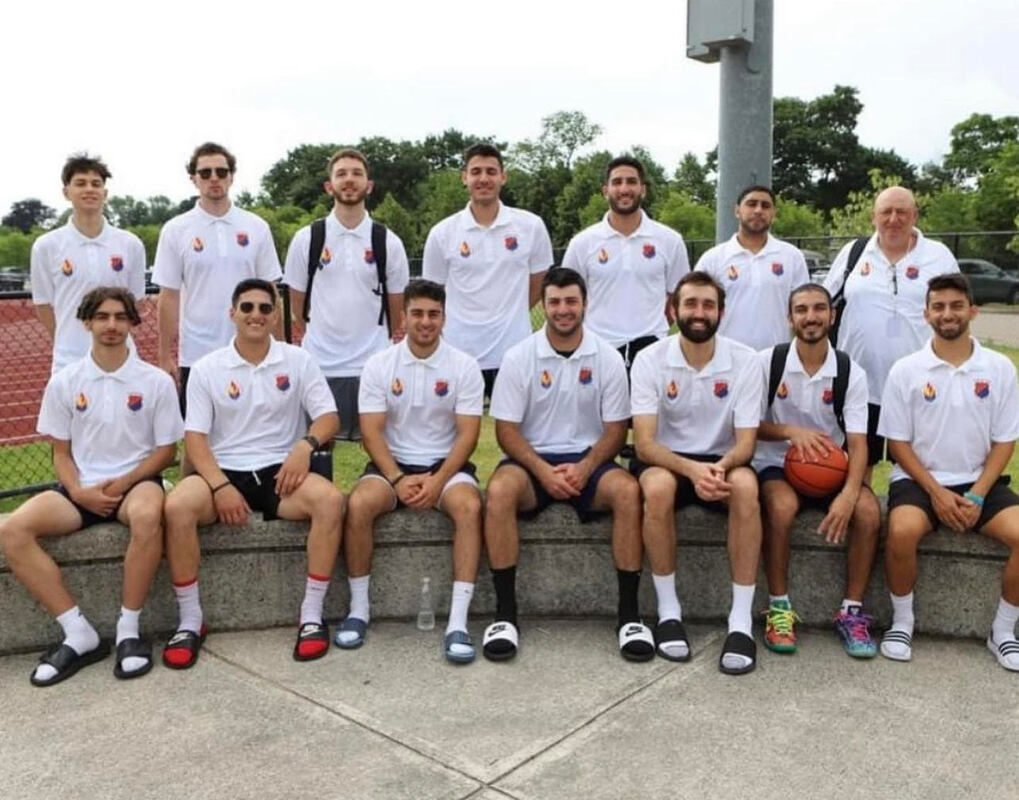 Members of the Homenetmen USA Eastern Region competing at the Pan Armenian Games in Yerevan, Armenia, July 2022, pictured with Coach Dikran Asdourian; included in the team picture are Merrimack Valley team members Richie Minasian, Armen Almasian & Michael Baltayan, Myles Couyoumjian, Rob Kouyoumjian & Jack Sarkissian The local chapter of the Homenetmen of Greater Merrimack Valley were thrilled to participate in in the Homenetmen Navasartian Games, hosted by Boston, and held locally in Woburn, Ma over the extended July 4th weekend. We had 16 senior men category members participate in Basketball and Volleyball. Our volleyball team won 1st place.
Greater Merrimack Valley Chapter participants were as follows: Armen Almasian, “Big” Mike Baltayan, Myles Couyoumjian, Rob Couyoumjian, Eddie Garibian, Mgo Kassabian, Dr. Henry Louis, Mike Mahlebjian, Robbie Mahlebjian, Haig Megerdichian, Rich Minasian, Alexander Movsessian, Edward Naroian, Jack Sarkissian and Richie Shahtanian. Our Basketball squad was also privileged and honored to have 6 of our members travel to Armenia during a 10 day stretch in late July to participate in the Pan Homenetmen Games, hosted in Armenia every 4 years. The six members selected were part of the greater Eastern USA Homenetmen team. The Eastern USA team took home the trophy of 1st place, an honor not achieved previously. Please enjoy the photo selections of the athletes from our region. We hope to build upon this success by inviting other age brackets, sports, and genders to join our Merrimack Chapter and participate. We look to add teams for Men’s Junior aged basketball, and Men’s Senior Soccer and Junior Soccer: Women’s Senior Soccer, Basketball, and Volleyball. Please reach out to Greg Minasian @201-218-7126 or email at [email protected]
0 Comments
We are pleased to announce the completion of the design and installation of a new sign in front of Saint Gregory Armenian Apostolic Church. The sign is simple, attractive, made of durable material and is mounted between two solid granite posts.
Design, manufacturing and installation of the sign was awarded to the Bridge Road Sign Co in Newbury, Mass. Installation was completed on Monday, July 11. The sign was a generous gift from the estate of the late Miss Elizabeth Koorkanian, who passed away in 2015. At the time a generous bequest from Miss Koorkanian's estate also went toward Saint Gregory Church's Endowment Fund. May God illuminate her soul in heavenly light. Pastor's Easter Message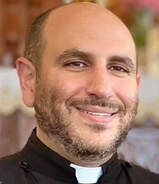 Christians gathered throughout the world today are celebrating Holy Pascha, or the glorious feast of the Resurrection of our Lord Jesus Christ. Following the tumultuous events that unfolded over the prior few days, which culminated in the crucifixion and burial of Jesus of Nazareth, the Gospels tell us that is was a moment of wonderment and great awe for the small number of people that became the first witnesses of the resurrection that day. Yes, the encounter with the resurrected Lord, and the “proof positive” that he had indeed been raised back to life meant a lot to the people who experienced it: Mary Magdalene, the other Myrrh-bearing women who went to the tomb early on Sunday morning, Peter and John and the rest of the twelve and the two disciples on the road to Emmaus. A lot can be said, and has been said, about the Holy Resurrection of our Lord – historically, theologically and inspirationally. Today, as we are gathered together to celebrate the Resurrection Feast with joy, I wanted to take a moment to contemplate together what meaning the resurrection has for our personal lives today.
Dearly beloved children of God, we all have the special privilege and honor of being comforted, inspired and instilled with joy today by the Holy Resurrection of our Lord Jesus Christ. It is my prayer that the resurrection of Christ would today bear witness to us that God is on our side in spiritual battles, that he has defeated death and it no longer needs to be an object of fear and that we no longer need to be so concerned about what happens to us during this life. This Easter, let’s each and every one of us praise Jesus our Lord for his triumphant resurrection. May it bring peace to our world, strength to his Holy Church and salvation to our souls, to the glory of his holy name. Քրիստոս յարեաւ ի մեռելոց: Օրհնեալ է յարութիւնն Քրիստոսի: Christ is risen from among the dead. Blessed is the resurrection of Christ. Prayerfully, Fr. Stephan Baljian Holy Pascha, April 2022 In 2021, your Board of Trustees focused on bringing our community back to together following a very difficult 2020 and the devastating impact of the COVID-19 pandemic. This goal had its challenges throughout the year as the pandemic surged and retreated several times. The process of reengaging required us to be mindful of striking the right balance between the health and safety of our people and the mission of our church, namely spiritual worship, fellowship, and charity.
With renewed excitement, our church “re-opened” in the spring after Massachusetts lifted restrictions on operating capacities, social distancing, and the wearing of masks. Those comfortable returning to church shared in our beautiful Badarak and reconnected during coffee hour. We had a very successful spring fair, fall picnic and holiday bazaar. Our Sunday School re-opened in person. Our Men’s club returned to hosting monthly dinners. Our anniversary banquet brought the community together for a wonderful mezza meal, graced with the presence of His Eminence Archbishop Anoushavan Tanielian. Our young athletes attended the AYF Olympics and returned with several medals. Care packages were sent to our youth studying home & away at college. The inaugural St. Gregory Bike-A-Thon was a great success and drew many of our youth. With great excitement, we finalized a design and secured work estimates to replace our church sign. The installation is planned for the spring 2022 once final town approvals are obtained and weather allows. Continuing with tradition, our community generously supported fundraising efforts for our brothers and sisters in Armenia & Lebanon and maintained our orphan sponsorship. Charity starts at home and our church provided a generous donation to the Lazarus house to close the year. The church ended 2021 with a net income of $18,981 versus $7,831 in 2020. The significant improvement in our financial stability has been due to the continued generosity of our members responding to our COVID appeal, the improved profitability of our fundraising events, further cost reductions, forgiveness of small business government PPP (Paycheck Protection Program) loans and importantly the continued generosity of our parishioners and friends – THANK YOU! Our church Endowment fund on 12/31/21 reached $477,002 up from the previous year end of $385,072. In addition to favorable investment appreciation, we were blessed to receive $50,000 and $10,000 respectively from the estates of our beloved Martha Hananian & Rose C Annaian. Looking ahead, we all should recognize that our church still faces many challenges. Membership and attendance are still in decline. The role of the church in people’s life is changing, requiring an openness to change, to adopt new ideas and to renew efforts of outreach – especially connecting with our younger families. In closing, I would like to thank Der Stephan for his continued spiritual leadership, guidance, and partnership. The Board of Trustees wish him and his family all of God’s blessings and we look forward to his continued spiritual guidance over the coming years. To my fellow Board of Trustees, thank you for your time, work & expertise in support of our church - I am privileged to have served with you and proud of our accomplishments. A special thanks to Trustee Armen Kourkounian who along with Jim Kochakian and myself will be leaving the Board after serving 6 consecutive years. Armen has been an incredibly valuable member of our board bringing new ideas, community spirit and limitless energy to our very important work. Lastly, I would like to thank all of our church organizations – both leadership & members, our deacons, acolytes and choir members for their time, expertise, and unwavering devotion to carry on the mission of the Church. Respectfully Submitted, Rob Kochakian Chairman Board of Trustees Pastor's Holy Nativity & Theophany Message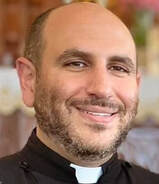 It’s about that time of year again… the beginning of a new year. And what usually comes along with the New Year? New Year’s Resolutions! I’m not sure what it is about it being the beginning of a different year that compels people to want to start (or stop) doing something in their lives. I guess the thinking goes, “New Year, new habits…” “new mindsets…” “new adventures…” But regardless of what our New Year’s resolutions look like or from where our motivation for them comes, one thing is for certain: they almost always involve our wanting to set “aright” something that is wrong or lacking in our lives. New Year’s resolutions show our tendency to want to rectify things in our life and are a resolve to make positive some negatives that have been bothering us in the past. They are an expression of our wish to do and be right. You very rarely hear – except maybe jokingly – an example of someone’s New Year’s resolution being to become less healthy, do more harm or be less of a force for good in the world. No, it’s usually just the opposite. Our resolutions show our desire to be kinder, to be healthier and to be all around better individuals both for ourselves and for the people around us. Today is the blessed and glorious Feast Day of our Lord’s Nativity and Theophany, his birth and his revelation upon the earth. Today all of humanity rejoices along with the heavenly hosts at the revelation of the Savior of the world and the salvation of the entire universe. Today we welcome the arrival and presence of one who is always “righteous.” We hardly ever hear the term “righteous” or “righteousness” used anymore in today’s language. To our modern ears, the word “righteous” sounds like a fancy, somewhat archaic term – a technical piece of verbiage that we encounter in dusty Bibles and fairly antiquated translations of our Liturgy. Yet, it is a word with a very simple and self-explanatory meaning. It simply means “morally right or justifiable.” In other words, doing what is “right” or acting in a “right” way is what constitutes righteousness. We read during the service of Chrorhnek – or Blessing of Water – commemorating the baptism of our Lord Jesus Christ, from the third Chapter of Matthew, about why he came to be baptized by St. John the Baptist. "Then Jesus came from Galilee to John at the Jordan, to be baptized by him. John would have prevented him, saying, 'I need to be baptized by you, and do you come to me?' But Jesus answered him, 'Let it be so now; for it is proper for us in this way to fulfill all righteousness.'" (Matthew 3:13-15) Here we have in the Gospel account the Son of God, Jesus of Nazareth coming to the River Jordan, where a movement had been started by his distant relative John. This movement was unlike anything that had risen among the Jews in Israel ever before: it was a movement of baptism for repentance in remission and forgiveness of sins. A public and ceremonial showing of the inner desire of a man to be done with sin and to make things “right” with God – which is to say, “become righteous.” We should state here that Jesus himself was without sin and had no need to be baptized in order to have his sins forgiven. This is why John the Baptist protested at first, saying essentially, “What are you doing coming to me? I – all of us, really – need to be baptized by you… you are the Savior and the Messiah. Indeed, the question of why it was that Jesus was baptized has been a difficult one to answer for most Church Fathers and theological scholars throughout the ages. I think the key to understanding this lies in Jesus’s statement “it is proper for us in this way to fulfill all righteousness.” At the time, the ritual of baptism was in use as a way for gentiles to purify their sins before converting to the Jewish faith. The Jews of the time, since they were under the Law, had very little concept of themselves as sinners in need of cleansing and restoration by God. Those belonging to the other nations were seen as dirtied and blemished by their sins and therefore in need of a ritual purification. This is why John’s baptismal movement was so novel and revolutionary when it first arose. It was the first time the Jews had been awakened to a need for God to cleanse their sins and set things right in their own personal lives. It shouldn’t be surprising to any of us, then, that God himself – revealed in the flesh as Jesus Christ – should not only come to be part of this movement of repentance and drawing closer to God’s Kingdom, but to ultimately take the reins and become the leader and fulfiller of this movement. Thus, St. John Chrysostom taught that even though Jesus had no need for baptism himself, he “freely identified himself with the people; otherwise he would have not come with the people for John’s baptism.” Noted author and Biblical commentator William Barclay explains it this way, “in his baptism he identified himself with those he came to save, in the hour of the new consciousness of their sin, and of their search for God.” No matter where we are in our search for God, Jesus comes to us and finds us. Jesus’s baptism “fulfills all righteousness” in our lives as well as those of all believers throughout time. He identifies himself with us so we can be identified with him. His baptismal waters become our baptismal waters; his purification our purification; his righteousness becomes our righteousness. So what is it in your life right now that you feel the need to make right with God? With others? With ourselves? It’s one thing to make a New Year’s resolution once a year, but what would you say if I told you that you had the opportunity to have Christ’s renewal every day? When we bring all of our sins and our shortcoming before him, he has the power to renew us and recreate us as new creatures who can do right because of his righteousness. “It is proper for us in this way to fulfill all righteousness.” This New Year and Christmas season, as we look ahead to the upcoming year with hope and anticipation, we rejoice in having a righteous Savior whose righteousness can cleanse us and make us righteous human beings in the sight of God. I propose we all make a resolution today to turn to him every day in prayer and thanksgiving, whether in good times or bad, repent of our sins and ask him to renew us daily with his righteousness, just as he did by being baptized along with us. On this glorious day of the birth and revelation of our Lord Jesus Christ, it is my prayer that we would all experience his love and forgiveness throughout the year and that by entrusting our life to him we would learn truly what it is to be renewed and made righteous in him. Amen. Prayerfully, Fr. Stephan Baljian, Pastor Holy Nativity & Theophany 2022 On Wednesday, January 5 and Thursday, January 6, parishioners of Saint Gregory Armenian Apostolic Church joined Armenian Apostolic Christians around the globe in celebrating the Holy Nativity & Theophany of our Lord Jesus Christ.
Although, due to the sudden uptick in cases of the "omicron" variant of Covid-19, it was a more subdued celebration this year, nonetheless it was still joyous and solemn for all who participated. On Wednesday evening, January 5, the Mid-Day and Vespers service were offered, followed by the service of Jrakalooyts readings from the Old Testament and Vigil Divine Liturgy. On Thursday morning, January 6, about 30 parishioners joined altar servers and choir members for the solemn Divine Liturgy, followed by Blessing of Water Chrorhnek service. This year's Godfather of the Cross was Mr. Nishan Baljian, son of Rev. Fr. Stephan & Yeretsgin Alice Baljian. Although the community Avak Luncheon that had been planned had to be cancelled, we look forward to being back next year to celebrate together the birth and revelation of our Lord. Ս. Ծննդեան Հայրապետական Պատգամ Ն.Ս.Օ.Տ.Տ. Արամ Ա. Կաթողիկոսի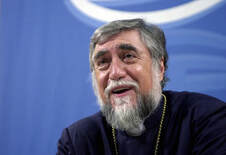 Յովհաննէս Առաքեալ իր Առաջին Ընդհանրական Նամակը կը սկսի վկայելով, թէ՝ Որդին, Բանը, որ նոյնինքն կեանքն էր, Բեթղեհէմի ճամբով յայտնուեցաւ մարդուն (1.1-2)։ Այս գծով անհրաժեշտ է հետեւեալ ընդգծումները կատարել.- – Աստուած՝ ստեղծիչը կեանքին։ Աստուածաշունչը կը հաստատէ, թէ Աստուած ստեղծիչն է կեանքին։ Տիեզերքի մէջ ոեւէ գոյութիւն ինքնագոյ չէ, իր գոյաւորիչը ունի։ Աստուած ոչինչէն ստեղծեց տիեզերքը իր բանական եւ ոչ-բանական արարածներով՝ ստեղծագործութեան մէջ իւրաքանչիւրին իւրայատուկ տեղն ու դերը ճշդելով։ – Մարդը՝ պսակը Աստուծոյ ստեղծագործութեան։ Հանգրուանային կերպով կատարած իր ստեղծագործութեան վերջին օրը Աստուած ստեղծեց մարդը։ Աստուածաշունչի առաջին գիրքը՝ Ծննդոցը մարդու ստեղծագործութեան երկու դրուագներու (1.27,2.7) ճամբով կը շեշտէ, թէ ի տարբերութիւն բոլոր արարածներէն, մարդը ստեղծուած է հողէն, օժտուած՝ բանականութեամբ, եւ որպէս Աստուծոյ գործակից, տիեզերքը կառավարելու յատուկ պարտականութիւն տրուած իրեն։ – Մարդու աստուածատուր կեանքի անկումը։ Աստուածաշունչը կը պատմէ, թէ ինչպէս առաջին մարդը, Ադամը, հաւատարիմ չգտնուեցաւ իր կոչումին, իրեն տրուած իշխանութիւնը օգտագործեց իր հաճոյքին ու փառքին համար եւ թերացաւ Աստուծոյ նկատմամբ իր համարատուութեան մէջ։ Այլ խօսքով, առաջին մարդը մեղանչեց եւ պատճառ դարձաւ որ «Ադամական մեղքը» ժառանգեն հետագայ բոլոր սերունդները։ Մարդու մեղքին հետեւանքով աստուածատուր կեանքը ապականեցաւ՝ չարիք ու վնաս պատճառելով նաեւ ողջ ստեղծագործութեան։ – Բեթղեհէմը՝ ծննդավայր նոր կեանքի։ Ադամի անհնազանդութեան պատճառով մեղքով ապականուած կեանքը Բեթղեհէմի մէջ Աստուծոյ Որդւոյն յայտնութեամբ վերանորոգուեցաւ։ Բեթղեհէմը դարձաւ ծննդավայրը նոր կեանքի։ Քրիստոս յայտարարեց՝ «Ես եմ կեանքը» (Յհ 14.6) եւ իր մարդեղութեան նպատակը բնորոշեց ըսելով՝ «Ես եկայ, որպէսզի կեանք ունենան» (Յհ 10.10)։ Նոր Կտակարանը յստակօրէն կը պարզէ, թէ Քրիստոսի առաքելութեան կիզակէտը, Բեթղեհէմէն մինչեւ Յարութիւն, մարդը օժտել էր նո՛ր կեանքով։ – Քրիստոս՝ ճամբայ նոր կեանք առաջնորդող։ Աստուծոյ մարդեղացեալ Որդին ո՛չ միայն ինքզինք ներկայացուց որպէս նոր կեանք, այլ նաեւ՝ միակ ճամբան դէպի նոր կեանք առաջնորդող (Յհ 14.6)։ Հետեւաբար, նոր կեանք ունենալու համար հարկ է դառնալ Քրիստոսին եւ քալել դէպի Քրիստոս տանող ճամբէն։ – Քրիստոս՝ աղբիւր յաւիտենական կեանքի։ Յովհաննէս Առաքեալ կը վկայէ, թէ Քրիստոսի ճամբով «Աստուած յաւիտենական կեանք տուաւ մեզի եւ այդ կեանքին աղբիւրը Որդին ի՛նքն է» (Ա.Յհ 5.11)։ Ան կը շարունակէ ըսելով՝ «մենք տեսանք եւ կը վկայենք, ձեզի պատմելով անոր մասին, այսինքն՝ յաւիտենական կեանքին մասին» (1.1-2)։ Քրիստոսի աշխարհ բերած կեանքը սովորական կեանք չէր։ Նոր Կտակարանը զայն կը բնութագրէ որպէս առաւել, լեցուն, ճշմարիտ, նոր կեանք, այլ խօսքով՝ յաւիտենական կեանք։ Յաւիտենական կեանքը մերժումն է մեղքով ու չարով տիրապետուած կեանքին, նիւթեղէն ու երկրաւոր արժէքներով առաջնորդուած կեանքին։ Յաւիտենական կեանքը Քրիստոսի ներկայութեամբ ապրուած կեանք է։ Ինչպէ՞ս կարելի է արժանի դառնալ յաւիտենական կեանքին։ Հետեւինք Աւետարանիչներուն ու Առաքեալներուն թելադրութիւններուն.- 1) Քրիստոսի հաւատալով։ Առաքեալը շեշտակիօրէն կը յիշեցնէ՝ թէ «ով որ կը հաւատայ Որդիին, յաւիտենական կեանք կ’ունենայ» (Յհ 3.36)։ Արդ, Քրիստոսը դաւանելով որպէս աշխարհի փրկիչը, մարդ արժանի կը դառնայ Քրիստոսի պարգեւած յաւիտենական կեանքին։ 2) Քրիստոսի հետեւելով։ Քրիստոս ըսաւ, ով որ ինծի կը հաւատայ, պէտք է հետեւի ինծի։ Արդ, որպէս յաւիտենական կեանքի աղբիւր, հարկ է մօտենալ Քրիստոսին։ Որպէս յաւիտենական կեանքի ճանապարհ, հարկ է քալել այդ ճամբէն։ Որպէս յաւիտենական կեանք տանող դուռ, հարկ է մտնել այդ դռնէն (Մտ 7.13-14)։ 3) Յաւիտենական կեանքը ապրելով։ Քրիստոսի հետեւիլ կ’ենթադրէ՝ Քրիստոս իր մէջ ընդունիլ, նոր մարդ դառնալ եւ նորոգուած կեանքով ապրիլ (Յհ 5.12, Բ.Կր 5.17, Հռ 6.6)։ Ա՛յս կը թելադրեն Քրիստոսի ներկայութիւնը ապրած առաքեալները։ Յաւիտենական կեանքով ապրիլ կը նշանակէ մեր նմանին ծառայել, արդարութիւն գործել, բարոյական ու հոգեւոր արժէքներով մեր կեանքը շաղախել, երկնային շնորհներով մեր կեանքը լեցնել եւ բարիք գործելով մեր ապրած օրերը իմաստաւորել։ Սիրելի՛ հայորդի, կեանքը Աստուծոյ պարգեւն է. զայն պէտք է ապրիլ մեր անձի նեղ պարունակէն ու մեր կեանքի սահմանափակ ծիրէն անդին ու վեր՝ երկնային արժէքներու ու յաւիտենական ճշմարտութիւններու համար։ Այս է Քրիստոսին ճամբով աշխարհին յայտնուած կեանքին որակը, իմաստը ու նպատակը։ Հետեւաբար, յաւիտենական կեանքը վախճանական երեւոյթ մը չէ, գալիք իրականութիւն մը չէ. ան արդէն եկած է աշխարհ Աստուծոյ Որդւոյն մարդեղութեամբ։ Քրիստոսի հետեւելու ուխտը կատարած մարդը կոչուած է զայն ապրելու՝ հաւատարմութեամբ, պատասխանատուութեամբ ու յանձնառութեամբ։ Առաքեալը կը պատգամէ՝ «Ամուր կառչէ յաւիտենական կեանքին, որուն քեզ հրաւիրեց Աստուած» (Ա.Տմ 6.12)։ Կ’ապրինք աշխարհի մը մէջ, ուր կեանքը, բնութեան թէ ընկերութեան մէջ, բարոյապէս ապականած է ու ֆիզիքապէս՝ վտանգուած։ Շրջապատուած ենք աստուածատուր կեանքը Աստուծմէ հեռացնող ու զայն մարդակեդրոն ու մարդանպատակ կեանքի վերածող երեւելի թէ աներեւոյթ չարերով ու չարիքներով։ Մարդուն կողմէ բնութեան պատճառուած չարիքներուն առընթեր, նաեւ մարդկային կեանքին անոր պատճառած չարիքներուն ահաւոր հետեւանքները կ’ապրինք մեր անձնական թէ հաւաքական կեանքի բոլոր մարզերէն ներս։ Արդարեւ, գիտութիւնը որքան փորձէ իր այլազան գիւտերով ու նորանոր իրագործումներով հարստացնել ու ապահովութիւն երաշխաւորել կեանքին, առանց մարդուն յաւիտենական կեանք պարգեւած Քրիստոսի կենսատու ներկայութեան՝ կեանքը կը դառնայ աննպատակ գոյութիւն։ Հոն, ուր իր արեան հեղումով մարդուն յաւիտենական կեանք պարգեւած Քրիստոս ներկայ է, մեղքը, չարը ու չարիքը հեռու կը մնան։ Բեթղեհէմը յաւիտենական կեանքին յայտնութիւնն է մարդուն։ Բեթղեհէմը երկնային հրաւէր է ուղղուած մարդուն՝ իր կեանքը Քրիստոսի վերանորոգիչ ներկայութեամբ շաղախելու, որպէս աղբիւրը յաւիտենական կեանքի։ Արդ, ա՛յս հաւատքով դառնանք Բեթղեհէմին ու ապրինք անոր խորհուրդը։ * * * Նոր Տարուան եւ Աստուածայայտնութեան տօներուն առիթով, եղբայրական սիրով կ’ողջունենք Ն.Ս.Օ.Տ.Տ. Գարեգին Բ. Ամենայն Հայոց Կաթողիկոսը, մաղթելով քաջառողջութիւն եւ եկեղեցաշէն ծառայութիւններով լեցուն երկար գահակալութիւն։ Քրիստոնէական սիրով կ’ողջունենք Երուսաղէմի Հայոց Պատրիարք՝ Ամենապատիւ Տ. Նուրհան Արք. Մանուկեանը եւ Թուրքիոյ Հայոց Պատրիարք Ամենապատիւ Տ. Սահակ Արք. Մաշալեանը, մաղթելով իրենց աստուածահաճոյ գործերով լեցուն ծառայութիւն։ Հայրական սիրով եւ հայրապետական օրհնութեամբ կ’ողջունենք Մեծի Տանն Կիլիկիոյ Կաթողիկոսութեան թեմերու առաջնորդները, հոգեւորական դասը ու ազգային իշխանութիւնները, հայ կեանքէն ներս գործող բոլոր միութիւններն ու կազմակերպութիւնները. ինչպէս նաեւ մեր ժողովուրդի սիրելի զաւակները, աղօթելով, որ Բեթղեհէմի յաւիտենական կեանքով պայծառակերպուի մեր ազգին կեանքը։ ԱՐԱՄ Ա. ԿԱԹՈՂԻԿՈՍ ՄԵԾԻ ՏԱՆՆ ԿԻԼԻԿԻՈՅ 6 Յունուար, 2022 Անթիլիաս, Լիբանան Pontifical Christmas Message of His Holiness Catholicos Aram I - 2022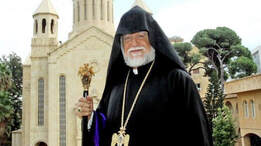 Translation by Fr. Stephan Baljian John the Apostle, in his first General Epistle begins by testifying, “The Son, the Word, who himself was Life,” was revealed to mankind by way of Bethlehem. Along this line I find it necessary to underscore the following points: God the Creator of Life The Bible asserts that God is the Creator of life. In the universe, no creation is created by itself; it has its creator. God created the universe, with its animate and inanimate objects, out of nothing, clarifying the place and role of each within the framework of creation. Mankind is the crowning feature of God’s Creation In the final step of creation, which was carried out incrementally, God created Man. The first book in the Bible, Genesis, in its two accounts of the creation of mankind, emphasizes that, in contrast to all other creatures, man was created from the earth, was endowed with the ability to speak and reason and as a partner with God was given the unique responsibility to govern his surroundings. The Fall of Man’s God-given Life The Bible tells us how the first man, Adam, was not found to be faithful to his calling, and instead used the authority given to him for his own pleasure and glory, falling short in his accountability to God. In other words, the first man sinned and became the reason that future generations would inherit the “Sin of Adam.” In consequence of the man’s sin, the God-given life was corrupted, causing evil and harm to the entirety of Creation. Bethlehem is the Birthplace of a New Life The life that had been corrupted because of the sin of Adam’s disobedience became renewed through the revelation of the Son of God in Bethlehem. Bethlehem became the birthplace of a new life. Jesus Christ proclaimed, “I am the life,” (Jn 14:6) and he declared the objective of his becoming man by saying, “I came that they may have life.” (Jn 10:10) The New Testament clearly spells out how the entire thrust of Christ’s mission, from Bethlehem until the Resurrection, was to endow mankind with a new life. Christ is the Way That Lads to New Life The incarnate Son of God not only presented himself as new life, but also as the only way that leads to new life. Therefore, in order to have this new life, it is necessary to turn to Christ and to walk on the path that leads to Him. Christ is the Source of Eternal Life John the Apostle testifies that through Jesus Christ “God gave us eternal life, and the source of that life is his Son.” (I Jn 5:11) He continues, saying, “we have seen it and testify to it, and declare to you the eternal life.” (I Jn 1:2) The life that Christ brought to earth was no ordinary life. The New Testament characterizes it as increasing, abundant, true and new life. In other words, eternal life. Eternal Life is a rejection of the life dominated by sin and evil and led with material and earthly values. Eternal life is life lived in the presence of Christ. So how can we become worthy of eternal life? Let us follow the wisdom of the Gospel writers and Apostles: 1. By believing in Christ. The Apostle emphatically reminds us that, “whoever believes in the Son has eternal life.” (Jn 3:36) Therefore, by confessing Jesus as the Savior of the world, man becomes worthy the eternal life that Jesus promises. 2. By following Christ. Christ himself said, “whoever believes in me, must follow me.” Thus, as the source of eternal life, we must draw near to Him. As he is the way to eternal life, we must walk along that way. As the door that leads to eternal life, we must enter through that door. 3. By living eternal life. For one to follow Jesus Christ assumes that one accepts him in one’s heart, becomes a new person and lives a renewed life. The Apostles who lived in the presence of Christ impress this upon us. To live the “eternal life” means to serve our peers, to do what is righteous, to permeate our lives with moral and spiritual values, to fill our lives with spiritual gifts and to enrich the days of our lives with good deeds. Dear Armenian children, life is a gift from God. Above and beyond the narrow confinements of our soul and the limited capacities of our daily lives, we must live it for supernal values and eternal truths. This is the quality, meaning and purpose of life, that was revealed to the world through the coming of the Christ. And so, eternal life is not a finite apparition, not a future reality; it has already come to the world by the incarnation of the Son of God. The person who has pledged to follow Christ is called to live Christ, in faithfulness, responsibility and dedication. Paul the Apostle proclaims, “take hold of eternal life, to which you were called by God.” (I Tim 6:12) We live in a world where life – both in nature and in civilization – is morally corrupt and physically endangered. We are surrounded by visible and invisible evils and evil works of those who would take the God-given life and turn it into a life that deters from God and has only self-gratification as its focus and aim. Along with the manmade evils that have befallen nature, we are also experiencing the awful effects of these evils on human life, in all arenas of our individual and collective lives. Surely, no matter how much Science tries, with its various discoveries and innovative experiments, to enrich and safeguard life, without the life-giving presence of Christ who has gifted eternal life to mankind, life becomes a pointless existence. From wherever there is the presence of Christ, who shed his blood in order to grant eternal life to mankind, sin, evil and evil deeds remain far away. Bethlehem is the revelation of eternal life to human beings. Bethlehem is a heavenly invitation to mankind, to steep his life in the renewing presence of Christ, as the source of eternal life. Thus, with this faith let us turn to Bethlehem and live its meaning. On the occasion of the New Year and the Feast of Holy Nativity & Theophany, I greet with brotherly love His Holiness Catholicos Karekin II of All Armenians, wishing him a long and healthy incumbency filled with service for the edification of the Church. With Christian love I greet the Armenian Patriarch of Jerusalem, His Beatitude Archbishop Nourhan Manougian, and the Armenian Patriarch of Constantinople, His Beatitude Archbishop Sahag Mashalian, wishing them both ministries filled with God-pleasing works. With fatherly love and patriarchal blessings, I greet the Diocesan Prelates of the Catholicosaste of the Great House of Cilicia, the ranks of the clergy and administrative officials, all committees and organizations active within Armenian community life, as well as all the beloved children of our People, praying that the life of our Nation would become resplendent through eternal life of Bethlehem. CATHOLICOS ARAM I of the Great House of Cilicia January 6, 2022 Antelias, Lebanon Pastor's Christmas Message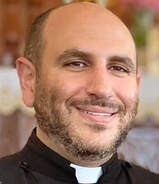 N.B. This message was delivered during the online 2021 Facebook special "Der Stephan's Fireside Christmas Eve. It’s that time of year again… Christmas and New Year. It is a time of year that is special… and different; sometimes complex, sometimes controversial. Sometimes crazy, sometimes even overwhelming. There are no explanations needed—you simply know what I mean! And while it’s true that this holiday “hullaballoo” will continue to visit and re-visit us perennially, there at least is an opportunity each year to cull and propagate a certain message of hope and inspiration to help us maybe make sense of a thing or two in life. Any time during the year could produce a fitting message, but it just seems to be a fact of life that the Christmas season, in all of its splendorous multichotomies, serves as the perfect wellspring for one such message. And so, across the fruited plain, in countless hamlets and villages, pastors and other religious leaders tap into this wellspring by their annual ritual of putting pen to paper, thought to written word, and producing a “Christmas message” in hopes of satisfying the need of the flock entrusted to their care. The need is simple: to figure out how the story of the birth and revelation of Jesus Christ speaks to each individual heart today. What does it mean for us today, in addition to what it meant at the time of its occurrence? The accounts of the foretelling, conception and birth of our Lord Jesus Christ are found primarily in the Gospels of Matthew and Luke. Based upon the foundation of these two narratives and leaving no stone unturned, countless hierarchs, pastors, homilists, writers and hymnographers throughout the centuries have exhibited, expounded, interpreted and re-interpreted the Christmas story using a vast array of styles and devices through a seemingly inexhaustible stream of innovation and creative powers. In addition to commentaries and expositions, there are countless novels, plays, pageants, musical compositions, motion pictures and things of the like that all strive to tell the Christmas story in a unique and novel way, each emphasizing a certain aspect or aspects of the traditional understanding of its meaning. One may emphasize the love of God revealed on Christmas, others the need for charity and love for fellow human as exhibited by Christ. Still others call attention to the very mystery of the Incarnation of the Word of God, who “became flesh and dwelt among us.” (John 1:14) Whatever the angle, we can surely count on an endless flow of Christmas messages in different media during the present and for the years and centuries to come. Yet, we can hear the Christmas story and the countless messages that accompany it thousands of times, but it will mean nothing to us if we have no response to it. What good is it if, like the above-mentioned “hullaballoo” of the season, we let the message slip by us and tuck it away in a box like all the Christmas decorations, until next year? You see, the Christmas story itself is a message and this kind of message demands a response, and the kind of response that is called for is change – something has to change in our life, in our actions, in our thinking. We must think and do something different from the way we have been thinking and doing things. Jesus Christ was born and revealed as God some 2,000 years ago, and for the most part, the world neither listened to nor responded to this message. If anything, its response was one of rejection and hatred for both the messenger and the message, resulting in the seeming defeat and death of both. In contrast, take a look at those people who did hear the message, and who did respond with a changed heart! “But as for those who received him, he gave to them – to those who would believe in his name – the authority to become children of God.” (John 1:12) “To those who received him…” “To those who would believe in his name…” This is the key here. Peoples’ lives were changed, their hearts softened and minds renewed, and through them eventually the whole world was transformed, because they heard the message of the incarnate Word of God and responded with acceptance and belief. Belief is not something dogmatic or theoretical. Belief translated into action means one thing in general: worship. Worship is the natural end of spiritual belief. Worship is the response that we see to the message of Christmas from those who truly received that message and believed Jesus as the Christ and Savior of the world. To worship God means to pour out from our hearts praise and thanksgiving in response to the great gift God has given us. Worship of Jesus Christ our Lord is the natural response of a being that has heard, comprehended and personally accepted the message of salvation brought at Christmas time. Just take a look at the examples from the story – they are numerous: Mary the Mother of God, when she heard the glad tidings from the angel at the annunciation, worshipped the Lord. Elizabeth, when she heard them from Mary, worshipped the Lord. John the Baptist, while he was still in the womb, when he merely heard Mary’s voice worshipped the Lord. “Glory to God in the highest,” sang the angels after their annunciation of glad tidings, worshipping the Lord. The shepherds, when they heard the news made the decision to go to Bethlehem, to see for themselves and to worship the Lord. The Wisemen had come in from a faraway land following a star on intuition, and when they arrived and saw what was unfolding before their eyes, their response was to worship the Lord. You can see how all of these, and countless others after them, did not remain indifferent but were profoundly transformed by their encounter with the Christ, the newborn king. They did now allow the message to become an intellectual exercise or remain just a set of historical facts. Each one made a deeply personal commitment to wholeheartedly offering their entire life to Jesus Christ as an act of worship. Likewise, we can’t let this celebration of Christmas be just a yearly reminder that some God in some place did something thousands of years ago that may or may not affect me. No, if you hear the message today that the Son of God was born in order to save you from your sins and invite you to eternal life in God’s Kingdom, now is the time to accept this message, let it change you and begin to worship the Lord on account of what he has done for YOU. In Saint Paul’s letter to the Romans we read, “I appeal to you therefore, brothers and sisters, by the mercies of God, to present your bodies as a living sacrifice, holy and acceptable to God, which is your spiritual worship” (Romans 12:1-2) God, through his loving kindness, has given you the great gift of salvation this Christmas. Accept this gift today, repent of your sins and present your body, your soul, your heart to him in worship. During this Christmas season, it is my prayer that we would all be touched once again by the message of the newborn Lord and Savior Jesus Christ, but that this would be the year that we truly let the message transform us, bring us to strong faith and conviction in his power to save, and give him the true and sincere worship of our hearts and minds. May the divine blessings of our Lord remain with you and your families during this holiday season and throughout the year. Prayerfully, Fr. Stephan Baljian, Pastor New Year & Christmas 2022 The parishioners of Saint Gregory Armenian Apostolic Church recently made a heartfelt donation of food items and money to the Lazarus House Ministries in Lawrence. Thanks to the generosity and charity of many parishioners, several boxes of food and small household items were collected. These items were delivered, along with a check for $500 (also thanks to generous donations), by Dn. John & Debbie Saryan.
This donation comes on the heels of another recent donation of $500 to the Artsakh telethon. We would like to thank all our parishioners who in a true spirit of Christian care and brotherhood have given of their abundance to those who are in need. 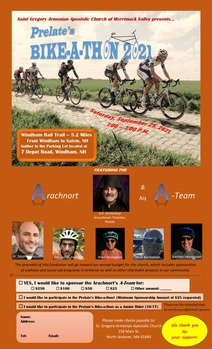 Saturday, September 25, 2021, was a beautiful day by any definition. The air was warm, the sun was shining... and about 25 members of Saint Gregory Armenian Apostolic church -- of varying ages -- turned out to the Windham Rail Trail in Windham, NH, for the first ever "Prelate's Bike-a-thon." Organized by Saint Gregory Church's Board of Trustees, the event was held under the auspices of His Eminence Archbishop Anoushavan Tanielian, Prelate of the Eastern Prelacy of the Armenian Apostolic Church of America. Archbishop Anoushavan personally led the "Arachnort's A-Team" for the 10.4 mile round trip bike-a-thon. The A-Team consisted of Fr. Stephan Baljian, pastor of the church, Dn. James Haddad, Steve Kochakian, Nina Hovsepian & Vartkes Hovsepian. Many other parishioners and friends of Saint Gregory Church turned out to ride along side them, or to participate as "junior riders." Some parishioners even came by to wish the participants luck and to send them on their way down the bike trail. To begin, Dn. James Haddad, a member of Saint Gregory's Board of Trustees and the main coordinator of the event, read a passage from Chapter 3 of St. Paul's letter to the Philippians, in which the Apostle writes, "I press on toward the goal for the prize of the heavenly call of God in Christ Jesus." Next, Der Stephan offered some welcoming remarks, thanked everyone for participating and gave some words of spiritual encouragement to the participants. Srpazan Hayr blessed all the participants with a pre-journey prayer. The Prelate's Bike-a-thon ended up being a wonderful community building event that brought together many people from all different walks and stages of life with their Prelate and Pastor, all in support of the church and community. We are grateful to the Prelate and Religious Council for conceiving the idea of a friendly athletic event led by the Prelate and for making the option available as a fundraising idea for the parishes. Coupled with our annual Anniversary Appeal, the two events together raised over $6,000 in funds for Saint Gregory Armenian Apostolic Church. 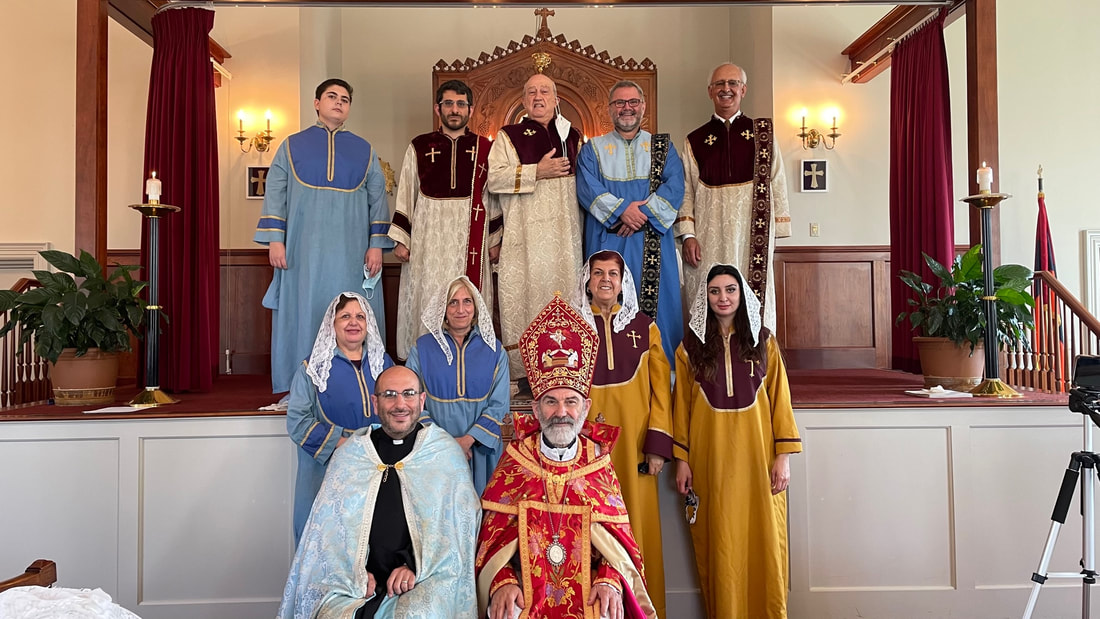 Saint Gregory Church Choir and Altar Servers, pictured with Archbishop Anoushavan Tanielian, Prelate & Fr. Stephan Baljian, Pastor; Front row (left to right): Sossy Jeknavorian, Sylvia Mahlebjian, Seta Ohannessian, Knarik Nerkararyan (Choir Director); Back row (left to right): Aram Ozoonian, Dn. James Haddad, Dn. Avedis Garavanian, Zareh Bulbulian (Stole bearer), Dn. John Saryan (Dn. Arek is absent from photo) On Sunday, September 26, on the occasion of the 51st Anniversary of the consecration of Saint Gregory Armenian Apostolic Church (September 1970), His Eminence Archbishop Anoushavan Tanielian, Prelate of the Eastern Prelacy of the Armenian Apostolic Church of America, celebrated the Divine Liturgy and delivered the sermon. On this occasion, he also blessed and re-dedicated the newly replaced crosses from the original consecration of Saint Gregory Armenian Apostolic Church in 1970. Requiem service was offered for all our deceased pastors, Godfathers, benefactors, Trustees and NRA delegates. 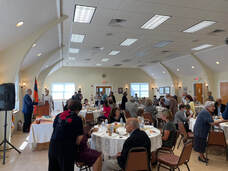 Following the church services, a light reception and program were held in Jaffarian Hall. His Eminence Archbishop Anoushavan Tanielian, Prelate, presided while Mr. Robert Kochakian, Chair of the Board of Trustees, served as Master of Ceremonies. This year's anniversary celebration was simpler and less elaborate than past years. The small organizing committee was led by Sossy Jeknavorian & Susan Parigian. A delicious spread of Near Eastern appetizers was offered at each table. The Anniversary cake was presented and cut by Mr. James Apovian Jr., a founding member of Saint Gregory Church and son of one of our first deacons, Hagop James Apovian. Joining Jimmy was Mrs. Ginny Shrestinian, wife of another of St. Gregory's original deacons, founding member and godfather, Ara Shrestinian. 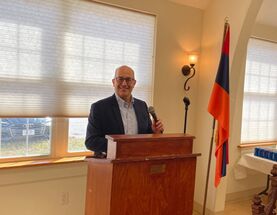 Mr. Robert Kochakian, Chairman of the Board of Trustees, served as M.C. for the afternoon Mr. Robert Kochakian, Chairman of the Board of Trustees, served as M.C. for the afternoon Addressing the attendees, Rev. Fr. Stephan Baljian, Pastor, thanked the entire community for its hard work and effort, especially during the previous year and a half while the parish navigated cautiously through the Covid-19 pandemic, which had greatly disrupted the normal routine of communal life. He encouraged all to continue to serve Saint Gregory Church and to keep it as a central part of the life of each parishioner, each family and the entire community. After thanking all those who supported and participated in the very successful Prelate's Bike-a-thon the day before, he went on to present a framed photograph of the Armenian tri-color flag flying over the North Andover Town Common this past April 24, given as a gift to the community by Ralph Arabian, who also took the photograph. The photograph will be displayed on one of the church's walls. Der Stephan introduced Archbishop Anoushavan and invited him to the podium to share his message. Srpazan Hayr congratulated the entire community and commended everyone involved with the planning of both the Bike-a-thon and the Anniversary reception. He even remarked at what lovely weather we were given, especially for the previous day's Bike-a-thon, despite the rainy weather that had been forecast. He reassured all present that even though Saint Gregory Church was not able to hold the grand, "official" observance of its 50th Anniversary (postponed from 2020), someday soon we would be able to celebrate this and further milestones. The program ended with Srpazan Hayr's benediction and the singing of Giligia. 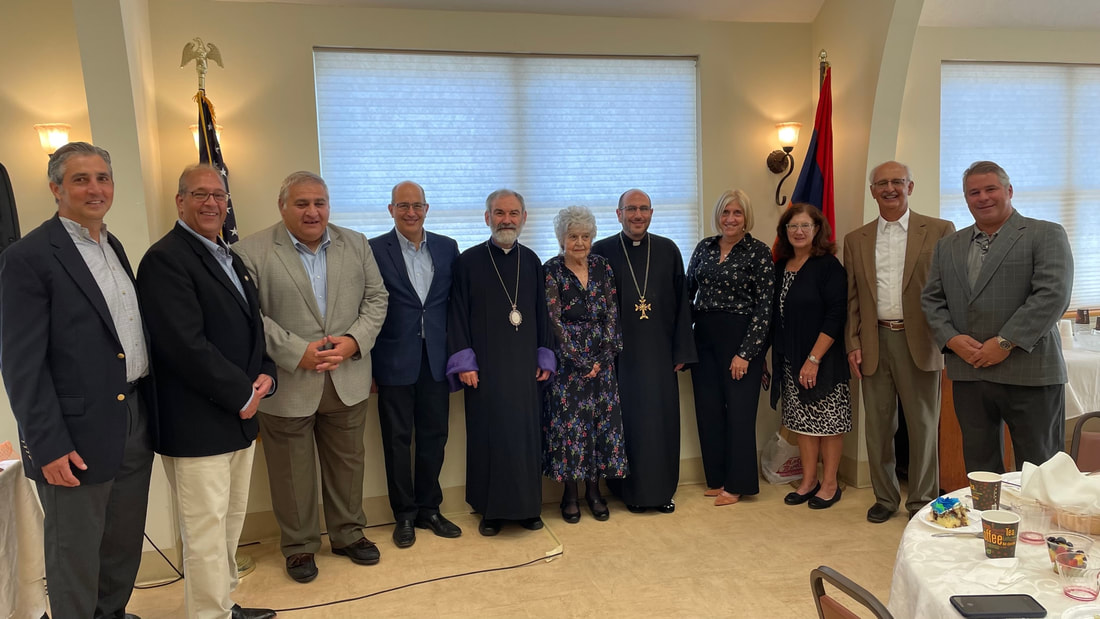 Pictured in this photograph, along with Archbishop Anoushavan Tanielian (Prelate) and Fr. Stephan Baljian (Pastor), are Trustees of Saint Gregory Armenian Apostolic Church (l to r) Joe Almasian, Steve Mahlebjian, Armen Kourkounian, Rob Kochakian (Chair), Sylvia Mahlebjian, Susan Parigian, Dr. John Saryan and National Representative Greg Afarian. In the center is Saint Gregory Church parishioner Violet Garabedian, who will turn 101 years old in October. Pastor's Message - Feast of the Exaltation of the Holy Cross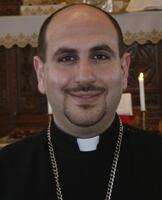 On Sunday, September 12, the people of the Armenian Apostolic Church celebrated with great joy and solemnity the Feast of the Exaltation of the Holy Cross. Much has been said and much has been written about the cross since the time of our Lord. It is the central symbol of our Christian faith, the one that is most recognizable to those outside the Church and the most appealing to those within. The Armenian people throughout the centuries have been particularly attached to the cross and the conviction of hope, promise of redemption and reminder of God’s compassionate love that it brings. This has been especially true during the many eras of persecution and turmoil that have been endured by our Church and Nation. Both individually and collectively, to countless generations of believers the cross has been a visual reminder of spiritual encouragement during the triumphs and tribulations of human life in this world. 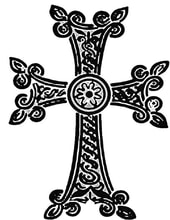 Many have asked, “why the cross?” Or even, “how did it work?” Or still, “Couldn’t there have been another way?” This last one seems to be the age-old question that seems to return perennially in one form or another. “Couldn’t there have been another way?” “When God wanted to redeem the world through his Son, why did it have to be through the cross? Could there have been some less grotesque and more convivial way for the Son of God save the earth from sin, other than the brutality of the cross?” This is, of course, a gargantuan question for which to try to come up with an answer, one that has been studied and written about exhaustively, for which we would need hours and hours of instructing to even begin to uncover. Suffice it to say that the short answer is “no.” No. There was no other way besides suffering and dying by which Our Lord could relay satisfactorily the exact message that God was to impart on humanity. This message is precisely that:
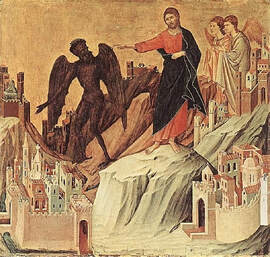 But we should mention that we have encountered these three truths in the Gospels before, and more particularly in the temptation of Jesus to forgo these things and to try to find “another way.” The Gospels record how, following his baptism in the Jordan River, Jesus was taken into the wilderness to fast and to be tested. Once he had fasted completely for forty days, Satan himself came to try to tempt him into renouncing these three things. First, he charged him to turn some stones into bread in order to abate his hunger. Jesus refused, quoting scripture “man does not live by bread alone, but by every word that comes from the mouth of God.” Next, he tells Jesus to throw himself down from the high pinnacle of the Temple in Jerusalem, claiming that God will send his legions of angels to rescue him. Jesus again refutes Satan, reminding him “You shall not put the Lord God to the test.” Finally, Satan takes Jesus to the summit of a very high mountain, showing him all the kingdoms and riches of the world, promising “all this I will give to you if you worship me.” In one last feat of strength, Jesus says, “Away from me, Satan! You shall worship only God alone!” The great Archbishop Fulton Sheen, of blessed memory, one of the most magnificent theologians and evangelists of modern times, writes a fascinating bit of scriptural commentary on this Gospel passage, which is contained in his book, “Life of Christ,” originally published in 1958. 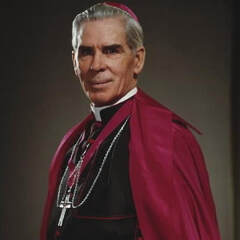 Archbishop Fulton Sheen (1895-1974) Archbishop Fulton Sheen (1895-1974) In speaking of Jesus’s first temptation to turn stones into bread in order to satisfy his hunger, he writes, “Our Lord would not use miraculous powers to provide food for himself, as he would not use miraculous powers, later on, to come down from the Cross…” The reason for this is that Jesus was asserting that what’s more important than feeding one’s self – or the hungry of the world – is that they receive the spiritual nourishment from God. In Archbishop Sheen’s interpretation, Jesus was saying to Satan, “You are tempting me away from my cross, suggesting that I be a cheap leader of people, filling their bellies instead of their souls… you would have me bring outer abundance instead of inner holiness. If I give bread alone, then man is no more than an animal… those who believe in me must hold to that faith, even when they are starved and weak, even when they are imprisoned and scourged.” Indeed, the cross shows Jesus starved and weak, imprisoned and scourged, and yet he remained steadfast in his belief that God would sustain and strengthen him, more than any relief brought by food or respite from suffering. “The second temptation, “Sheen writes, “was to forget the cross and replace it with an effortless display of power, which would make it easy for everyone to believe in him. If our Lord really trusted so much in the Father, he should prove it by doing a daring deed and giving the Father an opportunity to protect him.” But Archbishop Sheen points out two things: 1) “Faith in God must never contradict reason,” and 2) “If he did show such signs, he would certainly have all men running after him; but what would it profit them if sin was still on their souls?” To this he adds, referring to the cross, “It is only when I am seen on the cross that I really draw men to myself; it is by sacrifice, and not by marvels, that I must make my appeal… I must win followers not with material power, but with love.” He also reminds us that Jesus wants “men who will believe in me, even when I do not protect them… I want my missionaries and martyrs to love me in prison and death as I loved them in my own suffering.” In speaking of the final temptation of Jesus to reign over all the kingdoms of the world in exchange for bowing down to Satan, the blessed Archbishop writes, “Satan was lying in order to tempt our Lord again from the cross, by way of a short cut… inasmuch as the kingdom of this world was under the power of sin (and indeed Jesus even referred to Satan elsewhere as the “prince of this world”), even the new Kingdom which our Lord would establish – if inherited from Satan -- must be only a continuation of the old one. In short, he could have the earth, provided he promised not to change it. He could have mankind, as long as he promised not to redeem it… the kingdom that Satan offered was of the world, not of the Spirit. It would still be a kingdom of evil and the hearts of his subjects would not be regenerated.” Satan was in effect saying, “Forget your cross, your kingdom of heaven. If you want the world, it is at your feet.” But our Lord knew that these kingdoms could only be won by his suffering and death. Indeed, in all three of these examples, Jesus shows us how his death on the cross is going to have way more power and impact than anything Satan or his fallen world, or any kind of substitute power – that doesn’t involve suffering and self-sacrifice – could offer him. And not only that, his own association with suffering, pain, sorrow and death helps us to make sense of those things as we deal with them in our own lives, and encourages us to undertake those things with joy and thanksgiving to God, knowing that we lived in humility for others and not to serve our own selfish interests. Through his temptations at the beginning of his ministry and his crucifixion at the end, Jesus came to show us precisely that our life is not about filling our bellies and our egos and our pockets. But rather, by emptying himself – and ourselves – we find true nourishment in God, true power in our identity as his followers and true wealth, not in any kingdoms of the world, but in the eternal heavenly Kingdom, which he promised to his beloved ones. 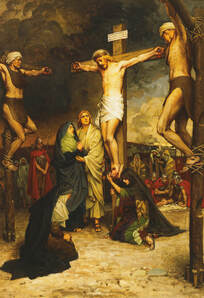 This, dearly beloved, is the true message that the Cross is speaking to us today and at all times. Jesus faced one last temptation to turn away from the path God’s will had for him and go after his own inclinations – while he was on the cross, the Roman soldiers, using the same qualifier as Satan himself, “If you are the Son of God…,” tempted him to come down from the cross. The thief on the cross next to him goaded, “aren’t you the Messiah, save yourself and us!” The crowds that had gathered mocked him and said, “he saved others; let him save himself if he is the Messiah!” He has the power! Let him walk away from this madness! Let him prove that he is in control! He had one last chance to walk away, but he didn’t. He didn’t want to become a cheap idol – all talk and no action, so to speak! Our Lord showed his power by totally emptying himself and dying on the cross, so that you and me would be redeemed, sanctified and raised to eternal life. There simply was no other way. The immense measure of love shown in the willing self-sacrifice of Jesus Christ our Lord is what today shows us the true power of the Holy Cross. Fr. Stephan Baljian, Pastor Feast of the Exaltation of the Holy Cross September 2021 Pastor's Message - Feast of the Assumption of the Holy Mother of God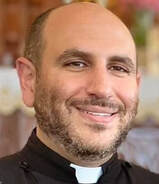 Today, the Christian Church all around the world celebrates the glorious feast of the Assumption or Dormition of the Holy Mother of God, Mary, into the heavenly kingdom of her son, our Lord and Savior Jesus Christ. The Armenian Apostolic Church and her people today rejoice especially, on this special feast day celebrating the woman who inspired and helped refashion our nation into one which houses the Holy Light of Christ and the truth of the Holy Gospel. Very early on, we abandoned the hope we had in lifeless idols like Anahid and others, and came to the light with the knowledge of our Lord Jesus Christ and the witness of the Holy Mother Asdvadzadzin Mary and all the other saints. The story of the Holy Virgin Mother Mary is one of simplicity and humility, yet also one of great power and acclaim. After all, God chose a simple, young teenaged girl to become the bearer of his incarnate Word, his Son and his image, in order to change the course of human history for all eternity. Simplicity, yet great consequences! Sometimes I marvel at how keenly self-aware we are as a species… equipped, it seems, with an innate ability to understand organically, almost instinctively, and appreciate the farthest reaches of our capabilities with little more than some introspection and some sincere guidance from those wiser than we are. Particularly visible to us are our achievements both personal and collective, and we seem to have a unique way of keeping track of those milestones those other than ourselves have reached. If there’s a record to be set, or broken, you can rest assured there will always be humans there to record it, admire it and celebrate it, no matter what its nature. After all, we as a human race have a natural tendency to want to rise higher, to be lifted up from our current predicaments and ascend new heights and horizons on the vista of life. It should be no wonder, then, that we highly esteem the greatest among us who have excelled at human endeavors and have scaled the mountains of knowledge, self-discipline, artistry and achievement in a great number of areas. In other words, we highly value the accomplishments of ourselves and our fellow human beings. Think about all the achievements of the human mind and spirit in the areas of the sciences like medicine and engineering, in literature, in music, in art, mathematics, and so on! I don’t need to list them for you. I’m sure each of you, upon hearing the fields I just mentioned were able to bring to mind countless images of the advancements achieved just in your own lifetime… or simply in recent memory. As an example, take the recent 2020 Olympic Games that just came to a close in Tokyo! Night after night we watched as new medalists rose to great heights of athletic glory, shattering records and inspiring the world with their determination and single-minded discipline in achieving greatness in their respective sports. I use this simply as a recent example. Otherwise, there are thousands of great achievements throughout history that we can point to as examples of the greatest of human feats of mastery. Yet, isn’t it funny that when it comes to the ultimate human feat –finding a way to live forever, which has constantly eluded the most ingenious minds throughout history, when a simple woman like the mother of our Lord achieves it by the grace of God, the world acts with disbelief, nonchalance or even skepticism? And let’s face it, in many ways it comes easier for us to marvel at the Olympic Athletes and the research scientists, or what have you, than to truly appreciate and marvel at Saint Mary for what she did, or more specifically what God chose to do through her. Now you might ask, “What did she really do?” It was God who chose her to be the mother of his Son; it was Jesus who came to take her into heaven at her Dormition, which signified the end of her earthly life anyway. We may ask, “Wasn’t she just in the right place at the right time?” Yet, if we are going to ask that question, then we must ask this one as well, “What were all those other people we mentioned before -- the ones with all the academic genius and the athletic prowess – doing, really?” Was it not simply using the gifts and talents that were given to them by God? Can we not say that the Holy Mother of God had been given an incredible gift of hope and a talent for faith that was beyond comparison? Each and every person who has achieved greatness has simply said “yes” to the talents and gifts that God has offered them. And I don’t care if it’s hiking mountains, fording rivers or simply raising your children to be decent people – in the end, these are all gifts that are given to us by our Lord. So, it would not be an exaggeration to say that Holy Mary, the Mother of God, did achieve greatness in her life by saying “yes” to the faith, humility and endurance that God had to give to her. By doing so she became an important part of God’s salvation for mankind, bringing the light of Jesus Christ into the world and becoming the first of any humans to be assumed into the heavenly kingdom, leaving us all with the hope of partaking in this gift when it is our turn -- something that I think, when looked at from the proper angle, is a pretty great human achievement!! While we Christians admire the aeronautical engineers, the master carpenters, the gymnastic gold medalists, the bridge builders and all the countless other people in our age or in ages past who have achieved great things, today we are especially in awe of our Lord’s mother, the Holy Virgin Mary – Asdvadzadzin – the birth-giver of God. During the Blessing of Grapes service, which is conducted on this most solemn feast day, we read the following words of Jesus from the Gospel of John: “Abide in me as I abide in you. Just as the branch cannot bear fruit by itself unless it abides in the vine, neither can you unless you abide in me. I am the vine, you are the branches. Those who abide in me and I in them bear much fruit, because apart from me you can do nothing.” (John 15:4-5) Today, we should recognize the need in our life to remain with our Lord, to “abide in him” as he says, just as his blessed mother, the Holy Virgin Mary did throughout her entire life. Apart from him we can do nothing – we have nothing. Apart from him, our lives remain empty and our efforts fruitless. Apart from him, we have no hope of drawing near to God the Father nor having renewed life with him in the kingdom of heaven. He is truly the source of everything we have or can have -- all human talents, skills, accomplishments and achievements. He is the one who has the power – not just in theory, but in proven reality – to assume us all into his heavenly kingdom, just as he did with Mother Mary. “The branch cannot bear fruit by itself unless it abides in the vine.” The Holy Mother of God, Mary, remained steadfast in the service of God, saying, “Behold, I am the handmaiden of the Lord” and obeying his will for her. Because of this she literally bore the “sweetest fruit” of all, Jesus Christ, for the whole world to taste of and be redeemed for eternity. The ancient Fathers of our Church asserted long ago that the Holy Cross is the Tree of Life, and the fruit that can be found hanging on it, Jesus himself, is the food that gives us eternal life. Today, we give thanks to Almighty God, and our Lord Jesus Christ, thanking and praising him for the most Holy Asdvadzadzin, Mary the Mother of God. On this most blessed feast day of her Assumption, I would like to congratulate all of you and wish you all the blessings of life in the Kingdom with our Lord’s holy mother. Prayerfully, Fr. Stephan Baljian, Pastor Feast of the Assumption 2021 His Eminence Archbishop Anoushavan Tanielian, Prelate, visited the Saint Gregory Armenian Apostolic Church on Sunday, July 11, 2021, the Feast of the Holy Transfiguration of Our Lord Jesus Christ. On that occasion, he presided over the Divine Liturgy at St. Gregory Armenian Apostolic Church, with Rev. Fr. Stephan Baljian, Pastor, as celebrant. The North Andover Armenian community was overjoyed on this occasion and the faithful of Saint Gregory Church came out in record numbers to welcome Srpazan Hayr for this "unofficial" visit, one of the countless weekly visits he has made to Prelacy parishes since the start of the Covid-19 pandemic in early 2020. Fr. Stephan Baljian, pastor of Saint Gregory Church, was particularly moved to have the Prelate present on such an auspicious occasion, the major feast day of Holy Transfiguration, or Vartavar, which is one of the five Tabernacle Feasts found in the calendar of the Armenian Apostolic Church. Several years ago, Der Stephan had compiled a brief prayer service consisting of hymns, Psalmody, readings and an excerpt from the lengthy "Prayer of St. Yeghishe" written on the occasion of the Feast Day. The theme of the service is the encounter the worshiper desires to have with the resplendent and majestic Lord on his holy mountain of heaven (symbolized by the Holy Altar). For the first time, this service was presided over by the Prelate, who also spoke about this theme in his sermon for the day. Following the Badarak, Archbishop Anoushavan was photographed with the church's Deacons and Choir, as well as the newly installed Board of Trustees and the parish's delegates to the National Representative Assembly. Following this, in Jaffarian Hall, there was a fellowship hour, which have recently resumed following the lifting of state regulations during the ongoing Covid-19 pandemic. 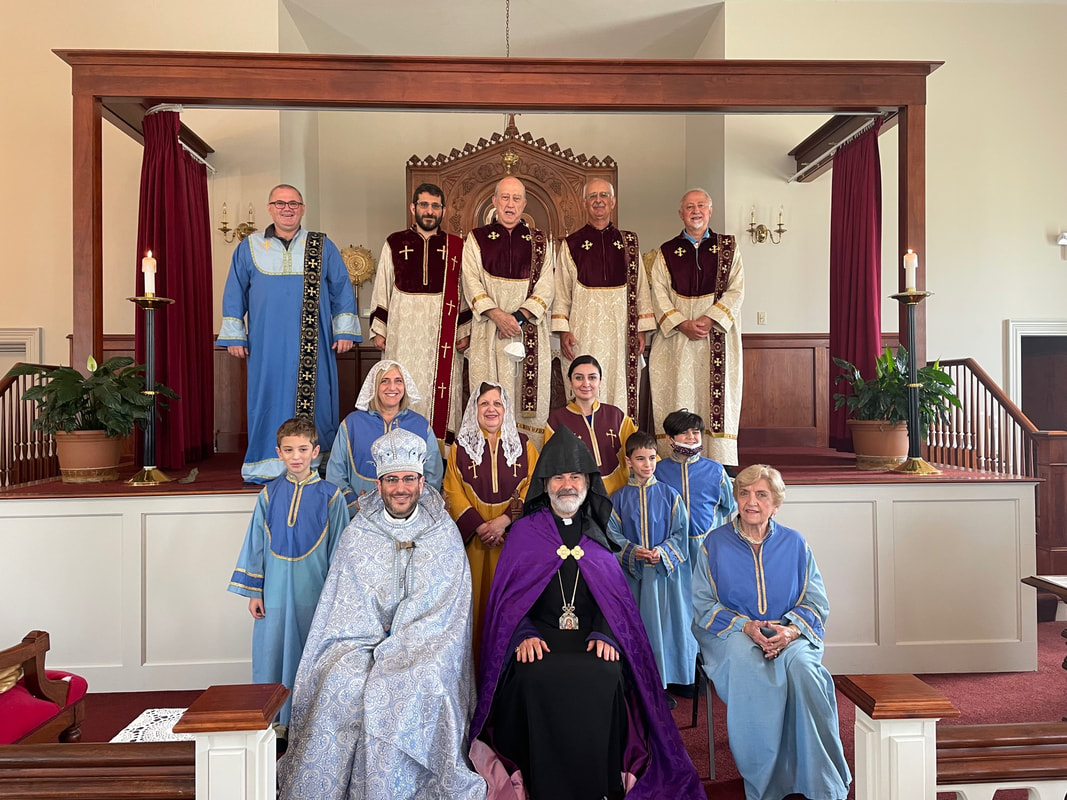 Front row (l to r): Nishan Baljian, Rev. Fr. Stephan Baljian (Pastor), H.E. Archbishop Anoushavan Tanielian (Prelate), Chake Boloian; Middle row: Sylvia Mahlebjian, Sossy Jeknavorian, Knarik Nerkararyan (Choir Director), Hovig Baljian, Gabriel Bulbulian; Back row: Zareh Bulbulian, Dn. James Haddad, Dn. Avedis Garavanian, Dn. John Saryan, Dn. Arek Kalayjian 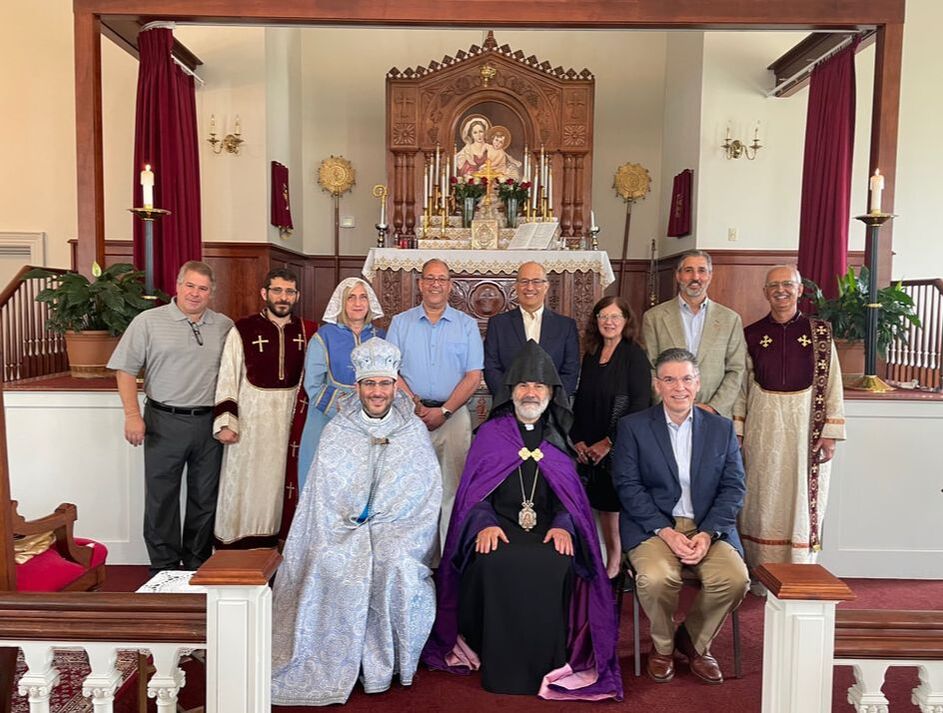 Front row (l to r): Rev. Fr. Stephan Baljian (Pastor), H.E. Archbishop Anoushavan Tanielian (Prelate), Mr. John Kulungian (Executive Council & NRA); Back row: Mr. Gregory Afarian (NRA), Dn. James Haddad (BOT), Mrs. Sylvia Mahlebjian (BOT), Mr. Steven Mahlebjian (BOT), Mr. Robert Kochakian (BOT Chair), Ms. Susan Parigian (BOT), Mr. Joseph Almasian (BOT), Dn. John Saryan (BOT); Missing from photo: Armen Kourkounian (BOT), James Kochakian (BOT), Gregory Minasian (NRA) Pastor's Message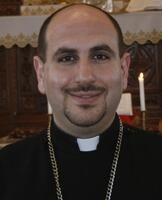 Today, July 4, is American Independence Day, the day that we celebrate our declaration of independence from foreign rule and the birth of our Republic. The two words that come to mind most often in thinking about Independence Day and the founding of our Republic are “freedom” and “independence." Conceptualized in terms of the American experience, “freedom,” on the one hand, is generally understood as freedom from tyrannical rule and government interference and overreach, while “independence” describes the ability of a nation to be free from dependence on foreign rule or meddling. These two, freedom and independence, have formed the foundation upon which this blessed nation has been built. Today, I wanted to take the opportunity to examine these two things, “freedom” and “independence,” from a Christian perspective. First, we must make sure we have a sound understanding of what “freedom” is, because it can often be misinterpreted or misappropriated. Too often, we think of “freedom” as the ability to do what we want, whenever we want to. While there is some element of this present in the Christian understanding of freedom, it does not paint the entire picture of what freedom is. Freedom in the classical understanding means having the ability for governing one’s self. A free person can assume the responsibility for his or her own thoughts, actions and life choices and has no need to be governed by a higher authority. This was along the lines of how our founding fathers envisioned the American Republic, and they greatly emphasized the need of the free individual to be governed by religious principles and morals, the reason being so that the person would not become captive to his own vices, which would lead to deviance, lawlessness, apprehension and ultimately imprisonment – the exact opposite of freedom! Indeed, according to the vision of the founding fathers, the freedom of the individual came with a lot of responsibility – for one’s own life, for one’s choices and for one’s behavior toward others. Now, let’s take a look at freedom from a Christian perspective. First off, we acknowledge the overarching principle seen from the time of Creation and throughout the whole of Biblical and human history: that mankind was created with free will and to live a life of freedom. However, in this case, it is freedom from the tyranny of evildoing and the captivity of sin and condemnation. Recall that when God created the first humans and placed them in the Paradise of Eden, they were free to live on their own and given the responsibility of leading godly lives in relationship with their Creator. They were advised, for their own good, not to eat of the Tree of the Knowledge of Good and Evil, yet they decided to use their free will to do something against God – something that would be detrimental to them both. This is the primordial example of the wrong understanding of “freedom” that I mentioned earlier. “Being ‘free’ means we can do whatever we want with no thought of the repercussions of our actions for ourselves or others.” Well, look what happened to Adam and Eve as a consequence of that attitude! Instead of freedom, they became enslaved to sin and captive to death, in desperate need of a savior and liberator all because they used their freedom without regarding the responsibility that accompanied it. Fast forward to now: this is the predicament of each and every one of us. While we have also been created with free will, endowed with our mental faculties and a conscience as our moral guide, we all have laid aside our God-given responsibilities and in one way or another have traded our sacred freedom for the prison cell of sin and personal transgression. Thanks be to God that he sent his Only-Begotten Son, Jesus Christ our Lord, for exactly this reason. In Chapter 8 of St. John’s Gospel, Jesus tells those who had believed in him, “If you continue in my word, you are truly my disciples; and you will know the truth and the truth will make you free.” In this passage, besides uttering one of the most well-known expressions in the English language, “the truth shall set you free,” Jesus reassures us that when we become acquainted with him, listen to him and follow him – meaning putting his Word to practice in our lives! – we have this freedom restored to us. We become free to choose him as Lord of our lives, free to choose what is good for our souls and free to stay away from sin, which harms and corrupts us. Later on in this same passage he continues, “Very truly, I tell you, everyone who commits a sin is a slave to sin. The slave does not have a permanent place in the household; the Son has a place there forever. So if the Son makes you free, you will be free indeed.” (John 8:34-36) In refutation of the twisted, hedonistic view of freedom I mentioned before, Jesus lovingly reminds us that if we use our freedom to sin, then we become prisoners to sin and thereby lose our freedom altogether. One cannot be captive to sin and continue to be called “free.” Thank God that Jesus Christ, the Son of the Heavenly Father, offers to “make us free,” and he did this not only in word, but with his willing death on the cross, as the Apostle Paul says in his letter to the Romans, “God proves his love for us in that while we were still sinners Christ died for us.” (Romans 8:5) Today we are reminded to always seek after our Lord for the life-giving freedom from sin that he has promised us. Now as concerns “Independence,” I’d like to start by acknowledging that dependence on God is vital to human existence and an essential tenet of our Christian faith. I do not believe that our founding fathers meant to imply that independence meant that people never had to depend on anyone, and certainly not on God. Recall that independence was conceived of more at the national, societal level rather than at the individual. In the Christian understanding, we believe we are called to be dependent on God. After all, he is the source of our life, our breath and our salvation. Even our Lord Jesus demonstrated this dependence perfectly throughout his earthly life, as he constantly sought to be at one with God through uniting his own will to that of the heavenly Father. Conversely, we would be right in affirming that no Christian should be dependent on sinful dealings or evil behavior, or anything contrary to God’s commandments. However, I do believe that somewhere in the middle there is some room to depend on the inventions of the world, the machinations of our hearts or the ministrations of our fellow man, as long as we are not overly dependent on these things. Do not misunderstand: all of these things are ultimately provided by God and, in good faith and in the right measure, are meant for us to trust in. What I mean to say by “overly dependent” is that we shouldn’t trust in these things of the world as things that our world has to offer us. Instead, we should always have in mind to give the credit to God himself and realize that it is upon him that we have come to depend – even when his aid comes to us in the form of our personal abilities, help from others or some tangible product of the world. Just a few minutes ago, we praised God for everything in our life, singing, “In all things you are blessed, Lord; we hymn you, we praise you, we give thanks to you, Lord our God.” In this beautiful praise song, we demonstrate both our dependence on God and our independence from want and need. For a beautiful example of this, let’s take a look at today’s Gospel reading, which tells of Jesus’s feeding of the 5,000 with just five loaves of bread and two fish. Jesus’s closest disciples wanted the large crowd to be totally dependent on the world in that moment. “Let them go so they can travel on their own to the nearby towns and buy bread for themselves!” In other words, “let them go so they can disunite instead of unite, travel away from instead of toward their Lord and go to take care of their own physical sustenance rather than depending on the source of their spiritual and physical nourishment for all that they need in this moment.” Not the ideal solution for them right then and there. Jesus had a better idea: “You give them something to eat.” In saying these six simple words, “you give them something to eat,” he summarized beautifully the idea that we can depend on God while receiving from others who have been sent by God for our benefit. While the disciples thought that the people had to depend on their own wallets and the nearby bakeries for food, Jesus knew that the people could depend on the disciples in that moment. Notice that he himself did not give the bread to the people, neither did he have any to give them right then. What he did have was the divine authority and wisdom to use one group of people and their abilities to bless another group that was dependent upon him. No doubt, the disciples needed the divine blessing from Jesus in order to perform this miracle, but in the end Jesus used them to provide the meal for the great multitude assembled that day. The disciples depended on the Lord for the blessing. The people depended on the disciples for the food. Today, we depend on those people and the miraculous Gospel story that enshrines them in history for testimony, inspiration and, indeed, to prepare our hearts and minds to receive this same blessed and consecrated bread that is offered to us every Sunday at the Holy Table. On this Independence Day, we pray to Almighty God that he would preserve our freedom as Christians, and help us to depend on him for all our needs in life. Prayerfully, Fr. Stephan Baljian, Pastor Saint Gregory Armenian Apostolic Church of Merrimack Valley July 4, 2021 by P. Richard Shahtanian, Esq. Every church community has its share of parishioners who stand out for their years of dedicated service and Saint Gregory Armenian Apostolic Church of Merrimack Valley is no exception to this fact. These faithful parishioners have been, and continue to be, essential to our existence as a church community. Chake Boloian is the perfect example of such a parishioner whose unwavering dedication is an amazing story of faith and love for her church.
Our church building was purchased on December 22, 1969. The founding members started everything from scratch, including its choir. During these initial years, the choir had a regular group of approximately eight singers and organists. Chake was one of those original choir members and since then has never looked back, even though it took her a while to feel comfortable. “I had no singing experience whatsoever and other than singing a little bit at my parochial school in Syria growing up, I never sang in front of people”, said Chake. She further explained, “I came to this country in 1957 and had to learn a lot of different things … I knew nothing about the Badarak but I learned over time by practicing at home and as a result I slowly became more comfortable with my voice and singing in church … I also learned to greatly appreciate the Badarak because it is such a beautiful and peaceful service that inspires and rejuvenates me.” That inspiration and rejuvenation is evident, given her length of service to the choir. In fact, it is remarkable that Chake is the only choir member from that original group over 50 years ago who still sings today. As most of you know, Chake and her husband Michael (known affectionately as “Red”) have three children, namely Carol Minasian, Sylvia Mahlebjian and John who was born the same year the church was purchased. Except for missing a few Sundays when John was a toddler or an occasional illness, Chake very rarely missed a Sunday in the choir. She was in her early thirties when John was born and she juggled raising her young family with her commitment to the church. Throughout all these years, she remained steadfast to not only her commitment to the choir but also to the Ladies’ Guild, Armenian Relief Society, and many other church related activities such as bazaars, Avak luncheons, and making Mas. Chake has served along with many different choir members throughout the years and has genuinely enjoyed each and every one of them. Nina Hovsepian is one of those members who began singing with Chake approximately 27 years ago and cherishes Chake’s mentorship, friendship, and inspiration. Here is what Nina had to say: “… for our St. Gregory community, Chake has been our committed melodious pillar connecting our choir to the Sharagans with her quiet confidence and harmonious leadership. She has an academic understanding of the Badarak. She signals when and what to sing, weaves her velvet voice measure to measure, and embraces both choir and congregation in her warmth and love. When I walk up into the church and see Chake in her choir shabeeg… there is a sigh of relief… all is in Divine order!” Another such member is Sossy Jeknavorian, our longtime Sunday School Director, who said the following: “When the choir was formed about 51 years ago, Chake joined the choir immediately and brought an incredible energy with her beautiful, sweet and perfect voice. She showed up every Sunday, sang the Sharagans and especially the beautiful solos. Singers have come and gone but Chake remains dedicated and sets an example for others… when I joined the choir, I was very nervous to sing the solos but Chake encouraged me and helped me to a point where she would nudge me and say “go” to start singing the solo… Chake has inspired me and many others. She is a remarkable person …” Chake’s dedicated service has not gone unnoticed. During the 46th Anniversary celebration of Saint Gregory Church in 2016, Chake was honored with the Distinguished Service Award from the Armenian Prelacy for her years of service with the choir. At that time, her son John recalled the following about his mother, “My sister remembers when she was little going to Saturday rehearsal with our mom and lying around the pews while she practiced… we had an organ in the house that my dad purchased for her, just so she could sing and practice. She has not stopped and my dad still wears the biggest smile of all when she sings. He would remind us all the time when we were in the sanctuary, ‘that’s your mother singing.’” Our parish priest, Rev. Fr. Stephan Baljian, was installed as our pastor just a few years prior to her being honored by the Armenian Prelacy. Der Hayr has a lot to say about Chake’s service but he clearly recalls his very first Badaraks at our church and remembered how impressed he was with our choir and specifically with our dedicated Choir Director, Knarik Nerkararyan, and Chake. “I remember thinking to myself that Knarik is so incredibly talented and professional and Chake is the headliner and matriarch!,” Der Hayr said. Typically, Chake and Red were the first parishioners to arrive at church on a Sunday morning until COVID-19 prevented them from doing so. The pandemic, along with other age related ailments, took away one of the most important things in her life. “We missed so much going to church together on Sunday and I felt empty but it was so good coming on Easter and we are going to try and start coming again regularly… I pray others will start coming back too,” said Chake. It is clear that although Chake may have slowed a little bit physically over the last few years, her mind and Christian faith are stronger than ever. Also, during these last few years, daughter Sylvia began singing in the choir. Sylvia and Knarik have been a dynamic duo during the pandemic and Chake’s passing of the baton to Sylvia makes her story even more amazing and special. Chake explained, “I never pushed Sylvia to sing… it’s totally what she wants to do…I never believed in being a pushy person about anything… but I did tell her that it’s a big commitment especially while working as much as she does with three boys at home.” Sylvia, who works as the Senior Director of Talent Development at Analog Devices, admits she sometimes gets emotional having her mother alongside her in the choir. Like her mother, Sylvia is completely self-taught and although she enjoyed teaching Sunday School for many years, she finds a different and special kind of spiritual fulfillment serving in the choir. When Chake was asked how she feels about her daughter taking such a prominent role in the choir, she paused for a moment and emotionally said, “let’s just say that I’m very very proud of her.” Chake acknowledges that life was different 50 years ago as there were fewer activities and things competing for peoples’ time and attention. “Church was not only the main focus of our lives, but it was also the main focus for many others like us. I realize it’s different today… things have changed a little over the years… we made lifelong friends from our church and our social life centered around the church,” said Chake. She prays that the younger generations can also find that same closeness and spiritual connection to the church as her generation experienced. Fortunately, for all of us, the only thing that has changed for Chake Boloian over the years is that now you can find her daughter singing by her side. (Chake’s story is written in loving memory of Tom Vartabedian, who was a dear friend, mentor, and teacher to many in our community.) On Friday, April 23, a flag raising ceremony in commemoration of Armenian Martyrs Day took place at the North Andover Town Common, with the participation of around 30 residents of North Andover, Andover and surrounding towns. Just a short while later, a similar event took place at City Hall in Methuen, Massachusetts. This was also attended by a crowd of Armenians who reside in Methuen and surrounding towns. Fr. Stephan Baljian, pastor of Saint Gregory Armenian Apostolic church in North Andover, attended both events. Organized by the Armenian National Committee of Merrimack Valley, similar flag raising ceremonies took place in cities and towns throughout the Merrimack Valley (Massachusetts & New Hampshire) on Friday, April 23 and Saturday, April 24.
Առաջնորդ Սրբազան Հօր Ս. Զատիկի պատգամ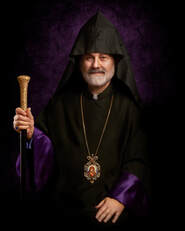 Քրիստոնեայ աշխարհը, առհասարակ, այսօր կը տօնախմբէ մեր Տիրոջ Յիսուս Քրիստոսի հրաշափառ Յարութիւնը՝ աստուածային գերազանց յաղթանակն ու անպարտելի զօրութիւնը երկնքի եւ երկրի բոլոր ոյժերուն վրայ անզուգական ձեւով, զոր կը կարդանք Սուրբ Գրքին մէջ. «Իմ ճամբաս տարբեր է մարդոց ճամբաներէն» (Ես 55.8)։ Արդարեւ, Ուրբաթ օր Երուսաղէմ՝ խաղաղութեան քաղաքը, թոհուբոհի եւ անորոշութեան մէջ էր։ Խելագարած ամբոխը, դրդուած ղեկավարներէն, կը գոռար՝ «թող խաչուի, թող խաչուի» (Մտ 27.23), շփոթահար կուսակալը ի զուր կը փորձէր մահուան վճիռը փոխել, իսկ ծախուած, լքուած եւ ուրացուած Վարդապետին աշակերտները ամբողջական յուսահատութեան մէջ էին։ Շաբաթ առաւօտ հոգեւոր ղեկավարները, դեռ եւս չգոհանալով խաչելով ու թաղելով Նազովրեցի Վարդապետը, կը խնդրեն Պիղատոսէն որ կնքէ գերեզմանը, առարկելով որ գուցէ Աշակերտները, որոնք սարսափահար խոյս տուած էին Իրենց Վարդապետին ձերբակալման պահուն, կը համարձակին գալ եւ գողնալ մարմինը՝ պահակներու հսկողութեան տակ գտնուող գերեզմանէն։ Ասիկա արդէն ծայր աստիճան արտառոցութիւն էր, որուն Պիղատոս ընթացք կու տայ հաճելի թուալու համար անոնց։ Զգուշութեան մարդկային բոլոր միջոցները երբ կը սպառին՝ լռեցնելու համար Անլռելին եւ անհետացնելու հետքը Անկորնչելի Արդարին, ահա Կիրակի առաւօտ Թաղեալ Լոյսը, որ Իր կենդանութեան յայտարարած էր «Ե՛ս եմ Յարութիւնը», գործով կ՛ապացուցէ մեռելներէն յարութիւն առնելով։ Յարութիւնը՝ Հաւատքի, Յոյսի եւ Սիրոյ յաւերժական արշալոյսը, գօտեպնդեց յուսահատած ու ցրուած Առաքեալները, որոնք իրենց հերթին լուսաւորեցին խաւարի ու անգիտութեան մէջ բնակողները։ Աշխարհին բացուելով, անոնք լիովին փոխակերպեցին ընկերութեան մտածողութիւնը՝ անդրանցնելու նիւթական եւ շօշափելի մօտեցումը մարդկային գոյութեան, եւ կեանքի գերագոյն նպատակը հասկնալու աստուածային պրիսմակէն դիտուած։ Արդարեւ, Յարութիւնը քօղազերծեց մահէն անդին յաւերժական կեանքի խորհուրդը, եւ երկրաւորներս պարուրեց անպատում այն ցնծութեամբ, թէ երկնաւոր Հօր Շնորհքով մահկանուցներս դարձեալ արժանացած ենք անմահութեան, եւ ուխտաւորներ ենք այս կեանքէն դէպի Կեանք։ Այսօր, մեր հաւատքի վերանորոգումն է, որ կը տօնակատարենք Յիսուս Քրիստոսի սուրբ Յարութեամբ, որ ոչի՛նչ խնայեց մեր փրկութեան համար։ Տառացի կերպով Ան զգեցաւ մեր մեղանչական բնութիւնը եւ զայն մաքրեց իր սուրբ արիւնով։ Մեզի՛ համար «ան կրեց մահուան վարձքը» (Հռ 6.23) եւ «Իր մահով ոչնչացուց մահուան խայթոցները» (Ա Կր 15.55), միանգամընդմիշտ մեզի հայթայթելով տոկուն փաստը, թէ Ինք կենդանի է եւ միշտ մեր հետ է, ինչպէս խոստացաւ առաքեալներուն (Մտ 28.20): Աւելին՝ Ան միշտ կը խօսի մեր հետ եւ ամենայն համբերութեամբ կը սպասէ Խաչին վրայ արտայայտած իր սիրոյն դրական պատասխանին։ Այս ուղղութեամբ, կ՛ուզեմ պատկեր մը գործածել գիտական աշխարհէն առնուած։ Արհեստագիտութեան հրաշալի գիւտերէն մէկը, այսպէս կոչուած GPSն է, որ կը խօսի եւ միշտ կ՚ուղղէ մեզ, որ հասնինք մեր նպատակադրած հասցէին։ Ամէն անգամ որ ձախողինք անոր հետեւելէ եւ կամ ճամբու վրայ անակնկալներ կամ փոփոխութիւններ պատահին, միշտ կ՚օգնէ մեզի, որ մեր ուղղութեան մէջ մնանք։ Այս երեք տառերը կը կազմեն սկզբնատառերը անգլերէնով G(lobal) P(ositioning) S(ystem) «համաշխարհային դիրքորոշման համակարգ» բառերուն։ Պահելով հանդերձ սկզբնատառերը, երբ փոխենք զայն հետեւեալին՝ G(od) S(peaks) P(ersonally) «Աստուած անձնապէս կը խօսի» մեր հետ, կը տեսնենք որ իրապէ՛ս Աստուած ՄԻՇՏ կը Խօսի մեր հետ եւ երբե՛ք չի հրաժարիր երբ մեղանչենք եւ հեռանանք Իրմէ։ Այս ձեւով մենք հասու կ՚ըլլանք նաեւ Բանականութիւն-Գիտութիւն եւ Հոգի-Հաւատք ներդաշնակութեան։ Արդարեւ, Աստուած բոլոր ժամանակներուն անձամբ խօսած է իր ստեղծագործութեան պսակ՝ մարդուն հետ։ Եդեմի պարտէզին մէջ՝ Նախածնողաց հետ, նահապետներու՝ Նոյի եւ Աբրահամի հետ, մարգարէներու՝ Մովսէսի, Սամուէլի, Դաւիթի հետ, եւ ի լրումն ժամանակի Աստուած անձամբ խօսեցաւ իր Միածնին՝ Յիսուսի Քրիստոսով եւ Առաքեալներու միջոցաւ համայն աշխարհին։ Հայ ժողովուրդը եղաւ առաջիններէն յարուցեալ Կենդանի Աստուծոյ Խօսքը լսելու եւ զայն թարգմանելու հաւատքի, մշակոյթի, արուեստի, ի մի բան՝ կեանքի բոլոր ոլորտներէն ներս։ Որքա՜ն հիասքանչ դասաւորում ըրած են մեր եկեղեցւոյ Հայրերը այս ուղղութեամբ, երբ ամէն անգամ որ Աւետարան կարդացուի, դպրաց դասը կ՛երգէ՝ «ասէ Աստուած» («Աստուած կ՛ըսէ, կը խօսի»), մեզի յիշեցնելով որ Աստուած ո՛չ միայն անցեալին, այլ նաեւ այսօր կը խօսի իւրաքանչիւրիս։ Այո՛, Աստուած մշտատեւ կը խօսի կեանքի եւ յարութեան մասին առհասարակ ամբողջ ստեղծագործութեան, մեր խղճի ձայնին, Սուրբ Գրքի ընդմէջէն, բայց մանաւանդ Յիսուս Քրիստոսով, որ ամենայն հեղինակութեամբ յայտարարեց՝ «Ե՛ս եմ Յարութիւնը եւ Կեանքը» (Յհ 14.6): Ո՛չ մէկ կասկած որ բազմաթիւ ճամբաներ կան ընթանալու, կրօններու ուսուցումներ կան ճշմարտութեան մասին, եւ գիտական աշխարհի խոստումներ՝ բարգաւաճ կեանքի համար, սուրբ Յարութեամբ աւետուած հաւատքը այդ ամէնքը ներառնելով հանդերձ մեզի կը փոխանցէ նոր պատգամ մը։ Յարուցեալ մեր Տէրը Յիսուս Քրիստոսը Իր արիւնով փրկուածներուս հետ կը փափաքի միշտ հաղորդակցութեան մէջ ըլլալ, խօսիլ մեր հետ ու լսել մեզ, եւ նորոգել մեզ։ Ինչպէս արեւը երկրի եւ ովկիանոսներու մակերեսին ու ընդերքը գտնուող էակները կը կենսաւորէ ու կը նորոգէ իւրաքանչիւրին առանձնայատկութիւնը պահելով, նմանապէս Յարուցեալ Քրիստոս՝ ներթափանցելով իւրաքանչիւրիս կեանքին մէջ, կը փոխակերպէ մեր անհատականութիւնն ու նկարագիրը, եւ աւելի կատարեալ կը դարձնէ մեր աշխարհահայեացքը եւ յարաբերական կեանքը։ Մենք մեզ յանձնելով եւ վստահելով յարուցեալ Քրիստոս Աստուած-GPSին, Ան ո՛չ միայն մեզ անսայթաք կ՛առաջնորդէ սահմանէ սահման, ցամաքամասէ ցամաքամաս, կամ նոյնիսկ մոլորակէ մոլարակ, այլ ժամանակի ու տարածքի հասկացողութենէն անդին անհունութիւն ու յարերժութիւն, կեանքը առ յաւէտ ապրելու Արարիչ Աստուծոյ հետ։ Այս հասկացողութեամբ տօնենք Խաչեալ, Թաղեալ մեր Տիրոջ Յիսուս Քրիստոսի Յարութեան խորհուրդը։ Համաշխարհային համավարակի, բայց մանաւանդ ազգային մեծ աղէտի դժնդակ այս շրջանին դիմաւորենք մեր կեանքին մէջ նորոգեալ հաւատքով Յարուցեալ Տէրը, որ խոստացաւ մեզի «Կեանք եւ առաւել կեանք պիտի ունենանք» (Յհ 10-10): Յոյսի ու Կեանքի նոր երգ երգենք յարութեան շունշով տոգորուած, նոյնիսկ մահուան ձորին մէջէն եթէ քալենք, վստահ ըլլալով որ Տէրը մեր հետ է (տե՛ս Սղ 23.4), եւ գոհաբանենք Ամենասուրբ Երրորդութիւնը յաւիտեանս․ ամէն։ Prelate's Easter Message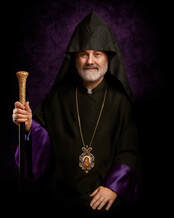 Today, Christendom celebrates the Feast of the Resurrection of our Lord Jesus Christ, the awesome victory of the Divine, invincible power over all heavenly and earthly powers, in a most unique and amazing way, as we read in the Scriptures, “My ways are different from your ways” (Isa 55:8). By Friday, Jerusalem, the city of peace, was in turmoil and confusion. Maddened crowds, instigated by their leaders, were yelling, “Crucify Him! Crucify Him!” (Mt 27:23). The perplexed governor in vain was pretending to have authority to overrule the verdict, and the followers of the betrayed Master were in total despair. By Saturday, the spiritual rulers, not content with the crucifixion, asked Pilate to seal the tomb, claiming that the fearful and hopeless Disciples, who fled away upon their Master’s arrest, might come and steal the body from the guarded tomb. This was the last of all ironies, which Pilate reluctantly accepted and imposed in order to please them. When all human means were exhausted to silence and annihilate the Righteous One, Lo! On Sunday, the Buried One who once taught “I am the Resurrection”, now proclaimed it in action by rising from the dead. The Resurrection, the eternal dawning of Faith, Hope and Love, girded the dispersed and despairing disciples, who in their turn, illuminated the minds of people everywhere dwelling in the darkness of ignorance. Going out into the world, the disciples transformed mindsets to transcend the visible and material approach to human existence and to understand life’s ultimate goal in the light of Divine perspective. Indeed, the Resurrection unveiled the mystery which lies beyond death, and filled the hearts of the human beings with joy that we, mortals, are rejuvenated in our immortality with our heavenly Father’s Grace, and are pilgrims from life to Life. And today, here we are to celebrate the renewal of our faith in the spirit of the Risen Lord, who spared nothing for our redemption. He literally took upon Himself our sinful nature and cleansed it with His sacred blood. For our sake He carried the wages of sin (Rom 6:23), and through His death, crushed the stings of death (cf. 1 Cor 15:55), providing us with tangible signs that He is alive and always with us, as He promised to His Disciples (Mt 228:20). Moreover, He speaks to us, and patiently waits for our positive reaction in response to His sacrificial love on the Cross. In this context, I would like to draw a picture derived from the world of science. One of the marvelous inventions of technology is the GPS, which speaks and helps us to get to our destination, and always recalculates when we fail to follow its instruction. By changing the wording of this wonderful instrument G(lobal) P(ositioning) S(ystem) to G(od) S(peaks) P(ersonally) to us and never gives up when we sin and we distance ourselves from Him, we will discover the harmony between Intellect-Science, and Soul-Faith. Indeed, God always had personally spoken with mankind, the crown of His Creation. In the Garden of Eden, God personally spoke to our foreparents. God personally spoke to the Patriarchs Noah and Abraham. God personally spoke to the Prophets Moses, David, Isaiah, and through them with His people. And in the fulfillment of time, God personally spoke in the very person of Jesus Christ, and through the apostles to the world at large. It is so amazing that in the Armenian Church we practice a very unique feature: the reading of the Gospels is always preceded by the choir’s brief solemn chant, “ Ասէ Աստուած – God speaks,” reminding us that not only in past but also today, God is speaking to each of us. Yes, my dear brothers and sisters, God always speaks with us through different means, by Mother Nature, our consciousness, the Scriptures and moreover through our Lord Jesus Christ, who solemnly announced, “I am the Way, the Truth and the Life” (Jn 14:6). Of course, there are many ways to think and to act; there are many religions teaching us about truth; and there are many sciences promising us prosperous life. Yet, as the shining sun, penetrating the very heart of the earth and oceans, gives life to each species and preserves their uniqueness, likewise the Risen Lord, penetrating each person’s life, transforms our personality, character, behavior, and makes us more perfect in our outlook, in our relationship with our spouses, children, peers, neighbors, colleagues, and with society at large. By committing ourselves to our God-“GPS,” He does not merely lead us from border to border, from land to land, from planet to planet, but from time and space to eternity and infinity, to enjoy and celebrate life forever in Him. With this understanding, let us celebrate the Resurrection of the Crucified and Risen Lord. Let us welcome the Risen Lord and with renewed faith follow Him who promised “That you may have life, and a more abundant life” (Jn 10:10). Let us truly sing the song of Hope and Life “even though I walk in the valley of the shadow of death, I will fear no evil, for You are with me” (Ps 23:4), and with thankful hearts, let us praise the life-giving All-Holy Trinity, Amen. Pastor's Easter Message*Usually on Easter Sunday, I make some kind of flip remark about how it is good to see everybody after a year. Also, I usually mention that I get a little nervous about preaching because it’s a bigger crowd, and because I am preaching to a lot of people that I haven’t seen in a while. Well, this year really has really put that into perspective for me; at this time most of us fall into that category because of what happened during this last year with the pandemic. So today I am going to leave the remarks aside and rather just offer my gratitude for seeing you all and having us all here together on this glorious feast of our Lord’s Resurrection – Easter Sunday. 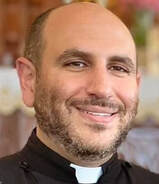 Քրիստոս յարեաւ ի մեռելոց: Օրհնեալ է յարութիւնն Քրիստոսի: Christ is risen from among the dead. Blessed is the resurrection of Christ! Many of you have said these words and repeated them at Eastertide throughout the years. Perhaps you learned this traditional Easter greeting, “Christ is risen from the dead,” when you were children and went to church with your families on Easter Sunday. Sometimes we think they are kind words, a nice way to greet somebody on Easter or simply a nice way to keep an ancient tradition. But did you know that when we say the words “Christ is risen from the dead,” we are really quoting scripture? You are actually reciting a passage from the Bible, from one of Saint Paul’s letters – his first letter to the Corinthians, in Chapter 15, verse 20, where he says, “But Christ has indeed been raised from the dead, the first fruits of those who have fallen asleep.” During this section of his letter, he talks at length about a certain trend he saw within the Corinthian Church. Some people were professing not to believe in the future universal resurrection of mankind, the teaching of which our church adheres to adamantly. Body and soul will be resurrected on the last day, the day of final judgment, when Jesus Christ will come again to establish his heavenly kingdom here on earth. There were many at the time who had varying beliefs. Some would say that this resurrection was only metaphorical, or that Jesus spoke of only a spiritual resurrection, not a physical one. Some were even saying that the resurrection had already taken place, or that the resurrection was really just that all the righteous at the time of their death are being raised up to heaven. Saint Paul vehemently refutes these erroneous teachings. He writes, “If it is preached that Christ is risen from the dead” – which was, and still is, the mainstay of the Christian preaching of the Gospel; without Christ’s resurrection, that means he is dead and gone forever! – “how can some among you say that ‘there is no resurrection of the dead?’” (I Corinthians 15:12) That’s the whole point of why we gather here Sunday after Sunday and especially on this Easter Sunday… it’s because Christ is NOT dead! He has been raised to life from among the dead and he lives today. As you and I are alive today, Jesus Christ is alive and he is seated at the right hand of his Father. Paul continues in verse 13, “But if there is no resurrection of the dead, then Christ has not been raised…” and still later on he says, “if Christ has not been raised, your faith is futile and you are still in your sins. Then those also who have fallen asleep in Christ” – meaning those who have gone before us – “have perished.” This would mean they are gone forever; there would be no hope of resurrection for anybody. His argument is two-fold and almost a sort of Catch 22:
It gives me chills sometimes when we read this passage, which happens (if you may have noticed) at the graveside funeral service. Every time we go to commit somebody to their final resting place, these are the words of comfort that we share with each other. As we are literally planting the person like a seed in the ground with the hope and expectation that on the last day that person is going to sprout up as a new creation, a new being – just like Christ did. As we begin to pour the blessed dirt upon our buried loved ones in the ground, we pray that “the blessing of God descend upon the grave of the deceased, so that it would blossom with new life on the last day.” Saint Paul describes this phenomenon later on in the same chapter. He says, “What is sown is perishable, what is raised is imperishable.” (I Corinthians 15: 42) And we saw that in Jesus. Over the past few days we’ve read the scriptures and sung the hymns and read the prayers about how Jesus broke his body, spilled his blood, died on the cross and was buried, in his human form physically withered and corruptible. But on the third day, today as we celebrate, he came out of the tomb victorious – incorruptible and triumphant over death. For this is what St. Paul means when he says, “Christ is indeed risen…” Not that only Jesus has arisen from among those who have died, but that he is the “first fruits of those that have fallen asleep.” (By the way, it would be a good place to mention here that when we say that “Christ is risen from the dead,” it doesn’t mean that he has risen from a state of being dead, or from the condition of death itself (even though both of those are true as well). What he means is that from among all those who have died – the “dead people” – Christ is now the one who has risen.) Picture again that image of the seed being planted into the ground and the plant sprouting up afterward. After patient waiting and expectation, the time comes for harvesting the fruit of those plants. Christ is the first fruit of that harvest. In the resurrection of all mankind, we all look forward to being harvested as fruit as well. In just a few moments, after my message is completed and we finish some prayers consecrating the holy body and blood of our Lord Jesus Christ for you, the faithful, to receive, you are going to see me turn around and hold up that chalice with the bread and the wine in it. And I’m going to say to you, “Eat of this, all of you, because this life and this is the hope of resurrection.” This means that when the celebrant presents to you Jesus, in his very flesh and blood, that we do not merely see him as the only one who is resurrected. We see in his resurrected body all of ourselves, as we live with the hope of that very same resurrection unto eternal life on the final day. Dearly beloved, the Armenian people throughout the ages, through our expression of faith through our Holy Mother Armenian Apostolic Church, have lived with this hope for centuries and centuries. May we carry on that Sacred Tradition as members of our beautiful, holy Mother Church, understanding that Christ’ resurrection is the sign of hope for the resurrection of us all. When we live and abide with him, always coming before him to see him as those first fruits, to see him as the promised resurrection for all mankind – and especially for us believers, to await with great hope our entrance into the Kingdom. Let us rejoice, not only today on Easter Sunday, but throughout the entire year. Let us be as those who joyfully hope in his resurrection, secure in the knowledge that our Lord Jesus has come to invite us all to eternal life in him. Քրիստոս յարեաւ ի մեռելոց: Օրհնեալ է յարութիւնն Քրիստոսի: Christ is risen from among the dead. Blessed is the resurrection of Christ! Prayerfully, Fr. Stephan Baljian Holy Pascha 2021 Pastor's Christmas Message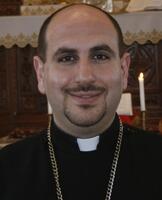 Christmas is our celebration of the birth and revelation of Jesus Christ our Lord. This evening, I will not get into when or what, exactly, we should be celebrate. Those are topics we can leave for another discussion. For right now, I want to focus solely on the fact that we should be celebrating and why. The year 2020 has been an extraordinary year to say the least. The difficulties of this year have been tough to grapple with: A worldwide Covid-19 pandemic continues to wreak havoc. Social and political unrest have taken hold here in the U.S. amid widespread allegations of fraud during the November election. Meanwhile, a devastating war and crushing defeat in Artsakh has thrust both the tiny republic and our homeland of Armenia into turmoil and insecurity. The Armenian people are in turmoil and are struggling to come to terms with this great loss of our national pride and security. In our culture, it has become popular to depict 2020 as a horrid year – despicable and unsalvageable as regards any promise or saving grace. Indeed, in a year that didn’t seem to give us much of a cause for celebration, it becomes all the more imperative that we make it a point to celebrate. What is this, you say? How could we possibly have anything for which to be thankful or to celebrate this year? The answer is that as difficult a task as this sounds, it still must be done! The birth of Jesus Christ and his revelation as God (Theophany) are meant to be for us the birth and rebirth of a new hope year after year. It is precisely when times are dangerous and uncertain that we must take pause, search deeper and truly comprehend what the prophetic meaning of “Emmanuel” is, or “God is with us.” For those who are unfamiliar, this word “Emmanuel” was used in the Prophecy of Isaiah (Chapter 7) to describe the Lord’s promised Messiah. It was the same name used by the angel who appeared to Joseph in a dream, as recorded in the first chapter of St. Matthew’s Gospel. The angel also adds that “Emmanuel” means “God is with us.” I can’t think of any more of a powerful and accurate description of the person of Jesus Christ. He is the very incarnation and embodiment of God’s Divine Nature. God becomes man and comes to live among us… this is the true story of Christmas. “God is with us” applies precisely to today’s situation and this becomes all the clearer to those living in difficult times under difficult circumstances. On this Christmas, and at all times, We must never forget that God is always with us through his Son, especially in the most difficult times. While the reality of God’s love revealed in Jesus Christ every year (and I would argue every day!) should be an inspiration and in our lives, it becomes all the more powerful this year as we trek through all these challenges guided by his enduring love and faithfulness. God our heavenly Father has promised to be with us; he sent his Son, our Lord Jesus Christ to be the physical and spiritual revelation of this truth. Now he gently reminds us not to despair and not to panic, as he did with the Apostle Peter on the waves of the sea (Matthew 14:27-30), saying, “I am here; do not be afraid!” This Christmas, I wish you all a genuine celebration of joy and that you would be encouraged by knowing you are not alone. “Emmanuel,” God is with us. Prayerfully, Fr. Stephan Baljian, Pastor On Sunday, September 27, 2020, Azerbaijan launched an unprovoked and heinous attack on the peaceful citizens of the Republic of Artsakh. This violent attack killed several thousand people and destabilized the peace and security of the region. Azerbaijan was caught withholding prisoners of war and many other war crimes.
In early November, a tentative peace deal was signed, the result of which ceded some 40% percent of the total land area of Artsakh to Azerbaijan. This included the crown city of Shushi, which the Armenian soldiers fought so bitterly to liberate from Azerbaijani captivity in 1992. It should be said that these lands were NEVER a part of an independent, post-Soviet Republic of Azerbaijan, and most certainly were not ever a part of Azerbaijan prior to the rise of the Soviet Union, as Azerbaijan did not exist as any kind of Republic or Sovereign Territory until 1918. The lands and provinces that make up Mountainous Artsakh (Lernayin Artsakhi Hanrabedutiun) always have been historic Armenian lands. While still reeling from this tragic loss of our ancestral homelands to a barbaric and hate-filled enemy power, the Armenian Diaspora has sprung into action, providing millions of dollars worth of aid to our compatriots in Stepanagerd and the remaining areas of the independent Artsakh Republic. Our Board of Trustees decided that it must lead our Saint Gregory Church community in helping to provide much needed relief. Providentially, an anonymous donor stepped forward and pledged to match up to $5,000 in donations raised from our community. We would like to say a sincere "thank you" to all who supported our fundraiser for Artsakh. We are pleased to report that our appeal for aid to Artsakh was successful and we were able to meet our goal of raising $5,000, which has been matched by our anonymous donor for a total of $10,000. The monies collected were allocated, half to each, between a special rebuilding program initiated by the Armenian Relief Society and an initiative undertaken by the Armenian American Medical Association (Boston Chapter) to provide Armenia and Artsakh with oxygen delivery systems (including oxygen concentrators and consumable components) that are badly needed during the Covid-19 pandemic. A "job well done" to Saint Gregory's parishioners. We are sure that as a community we will all experience the satisfaction of knowing we are helping the people of our homeland at this dire time. New Cross "Crowning" Achievement of Nearly 20-Year Building Renovation Project Sunday, September 27, 2020, was a historic day for Saint Gregory Armenian Apostolic Church of Merrimack Valley, and noteworthy in all its fifty-year history. Our Prelate and shepherd, His Eminence Archbishop Anoushavan Tanielian, payed a much-needed visit to a flock in need, adding to the festivities of the day with his great, spiritual presence. Srpazan Hayr celebrated the Divine Liturgy and delivered a powerful sermon. Drawing first on the meaning of the Feast of the Holy Cross of Mount Varak and the miraculous apparition that took place there through our Lord Jesus Christ’s true cross, he then revealed the sad news that just that morning the people of Artsakh had been attacked unexpectedly and swiftly by Azerbaijan. He called on the faithful of the Armenian Apostolic Church to pray for peace and prosperity in Armenia and Artsakh, and to stand beside the brave, heroic soldiers of the Armed Forces. At the conclusion of the Divine Liturgy, the church choir began to sing the hymn Oorakh lér Soorp Yégéghétsi (“Rejoice, O Holy Church), while under Srpazan Hayr’s leadership, and accompanied by the church’s pastor, Rev. Father Stephan Baljian, all the people went out in procession to the side yard of the church. They were about to witness the reality of the words of the above-mentioned hymn, that truly “Christ, the King of Heaven, has crowned you with his Holy Cross.” The Rite of Consecration of a New Cross was celebrated and the cross anointed. At the completion of the Rite, and after the singing of “Giligia,” then came joyful and emotion-filled moment, when the Saint Gregory Church edifice would be crowned with a gold colored Armenian-style cross. In front of the gazing crowd, the cross blessed and anointed with the Holy Chrism was raised and secured into its place by the construction workers on hand. We note that the “crowning” of this Holy Cross was not meant only to adorn the church’s pinnacled roofs. But also, it became the crowning achievement and pinnacle of a complete and exhaustive renovation project which has lasted nearly 20 years and has seen the renovation of the church sanctuary, the adjunct “Jaffarian Hall,” the church offices and classrooms, the youth facilities as well as other reconstruction and renovation. We note also that the cross consecration event, because of the Coronavirus pandemic, unfortunately had to be postponed from last April. Also, the weekend of this event had originally been slated to celebrate the 50th anniversary of the church’s consecration in September of 1970, but this too has had to be postponed until next year. That notwithstanding, the faithful children of this community greeted with great excitement and gratitude this milestone, which had been awaited for many years, was postponed just a little further, but whose day had finally arrived! In the afternoon, on the outside patio adjacent to the church, a modest reception was held, attended by the faithful (but properly “socially distanced”). The church’s pastor acted as Master of Ceremonies for the brief program. First, Der Stephan, on behalf of the entire community, thanked Archbishop Anoushavan, the Board of Trustees and the hard-working members of the Building Committee, as well as all donors and benefactors who through their financial and moral support assisted in bringing this project to its completion.
In turn, remarks were also offered by Board of Trustees chairman, Gregory Afarian, and former chairman of the now dissolved Building Committee, Mr. P. Richard Shahtanian, Esq. Then Der Hayr invited the Prelate to offer his concluding remarks. During his remarks Srpazan Hayr congratulated the entire community and offered high commendations to all those persons active in the project at hand. Praising the church community for being faithful and God-centered, he also noted that, despite all the obstacles and challenges brought about by the Coronavirus pandemic, the North Andover church could stand as an example to other church communities in the Prelacy. “Even though you did not get to celebrate your 50th Anniversary this year,” he said, “Next year you will be able to celebrate Fifty years – Plus One! And therefore that shows how you are always looking to achieve better.” He stated any other of the Prelacy church communities who have had to postpone anniversaries or put off other plans can look to Saint Gregory Church for encouragement and will be able to accomplish those things to an even greater extent in the coming years. Rising to their feet, the people received Srpazan Hayr’s blessing and dismissal, after which all began to depart for their homes – all the while gazing up at the newly placed and shining cross. On Thursday, June 4, a small group volunteers representing Saint Gregory Armenian Apostolic Church and the Lowell "Lousintak" and Merrimack Valley "Arax" Chapters of the Armenian Relief Society, gathered to make bagged lunches for the North Andover Fire and Police Departments, as well as for the elderly in our community. In place of our monthly Avak Luncheon, which would have been held that day, a total of 23 lunches were delivered to senior parishioners throughout the Merrimack Valley. We would like to thank those who volunteered for this outreach project. Your dedication to our church and community are much appreciated.
|
Archives
May 2024
Categories |
Location |
SEARCH
Contact Us |

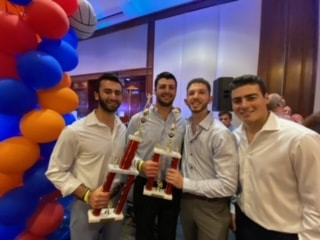


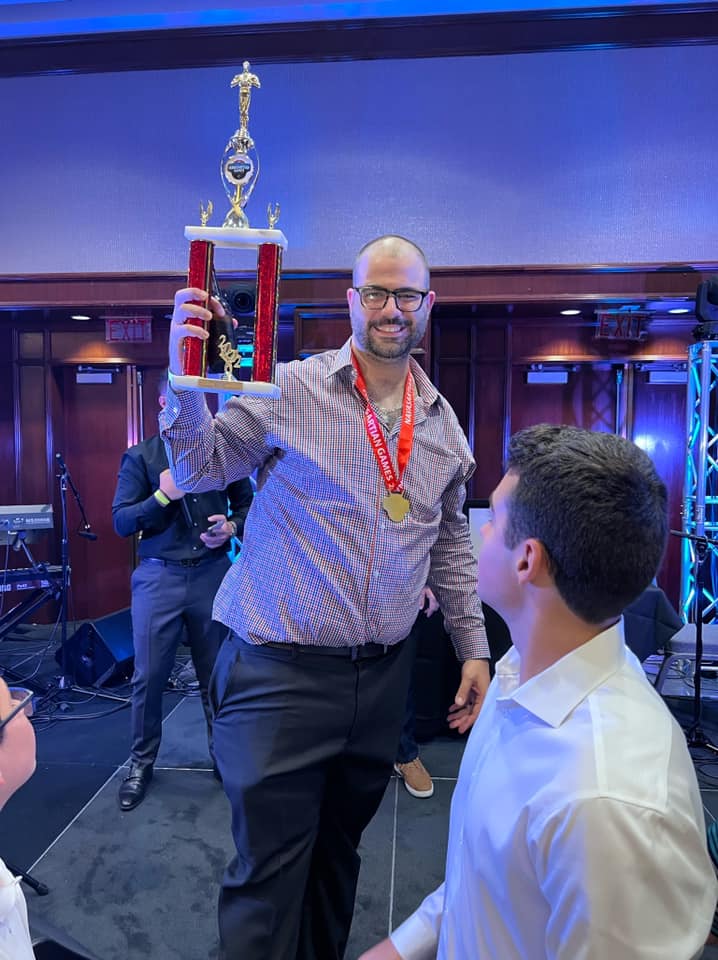

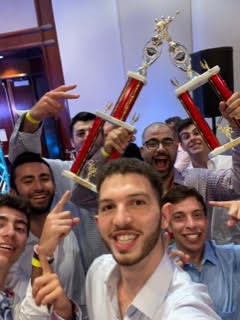
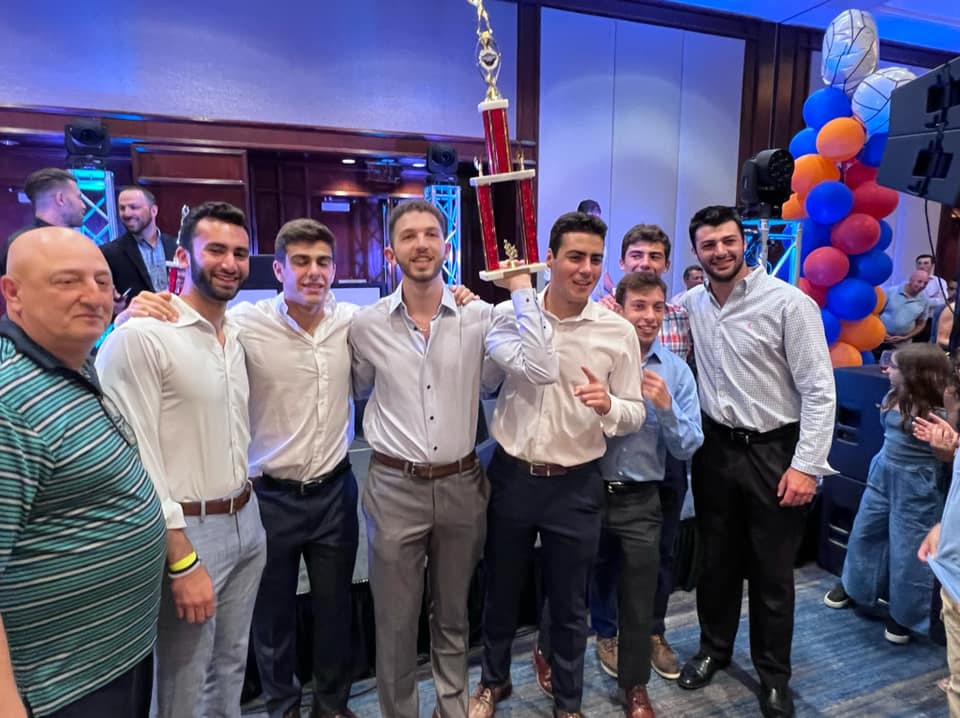
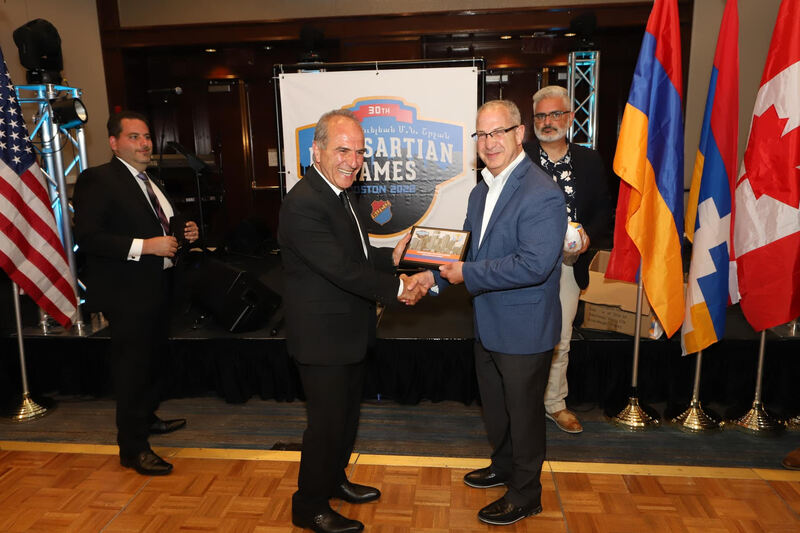
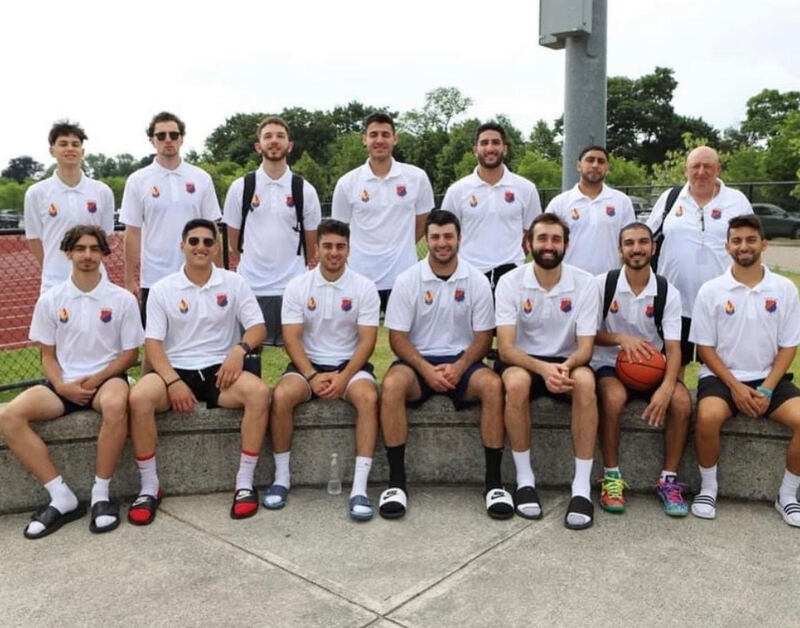
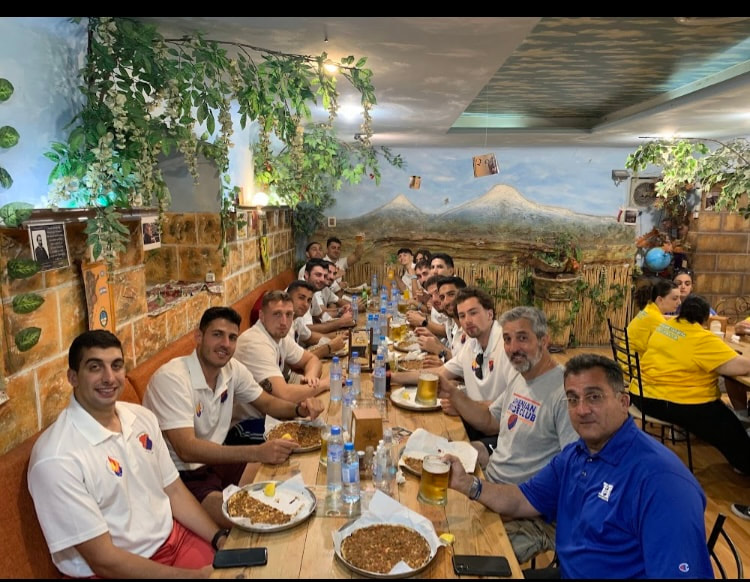




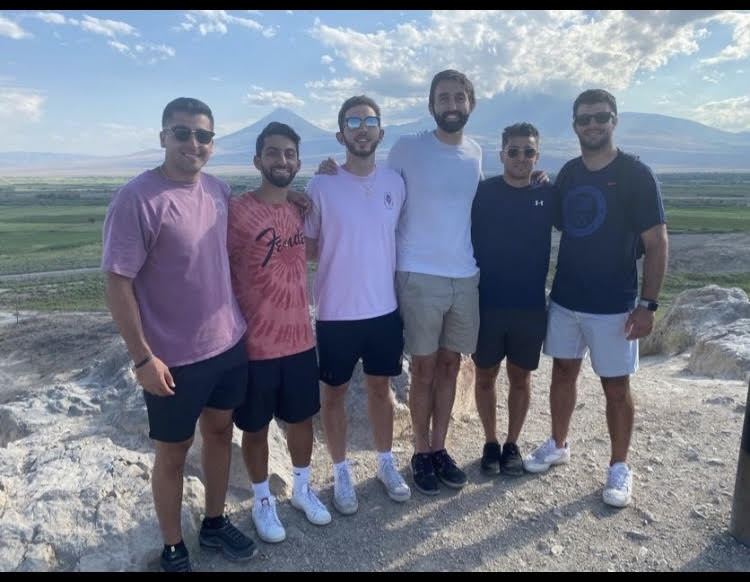
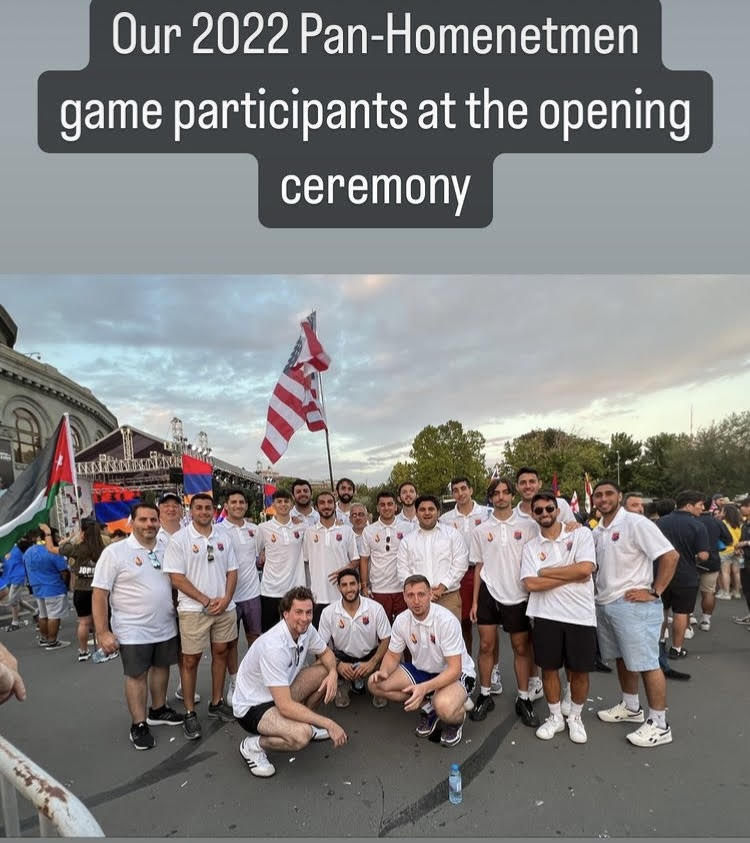
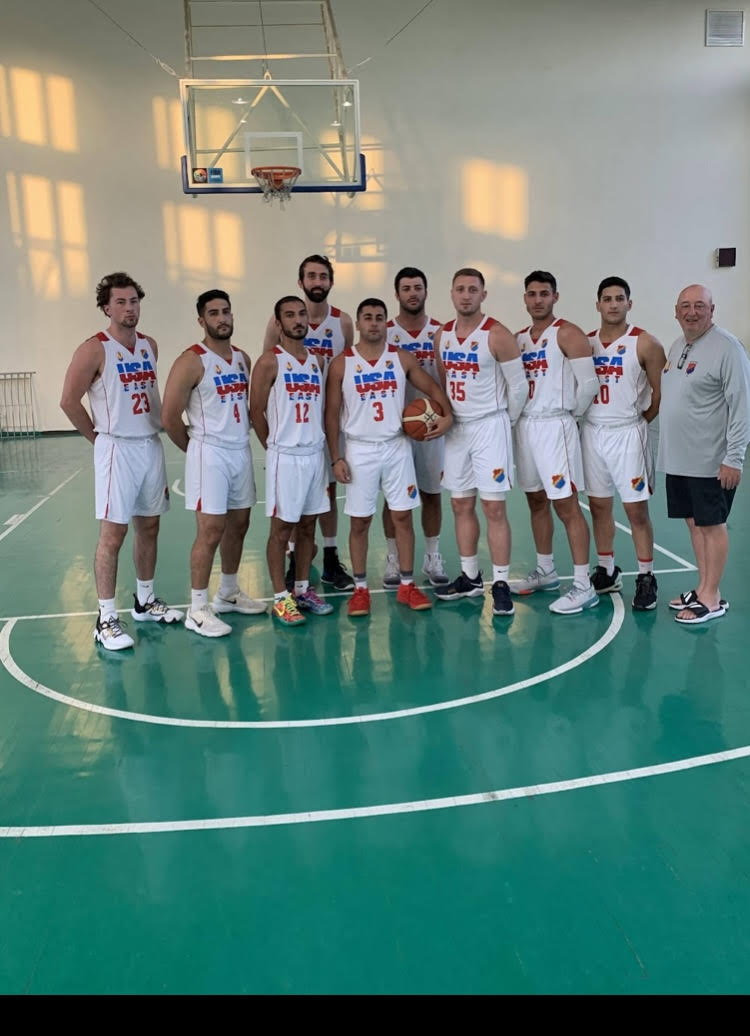

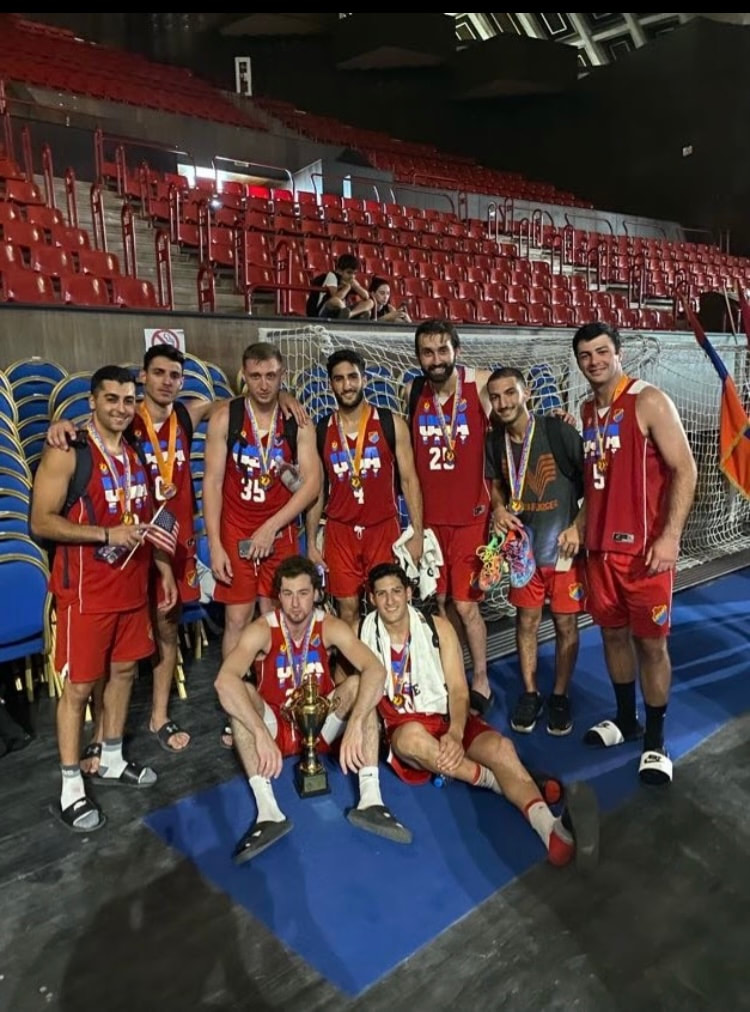
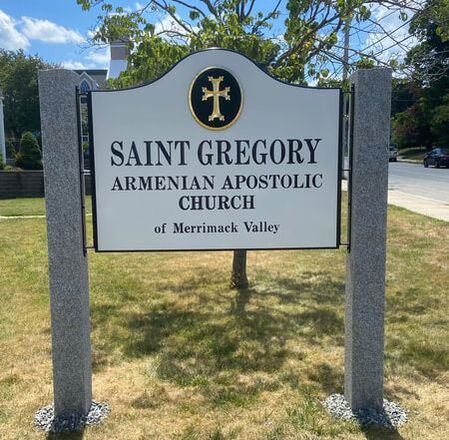
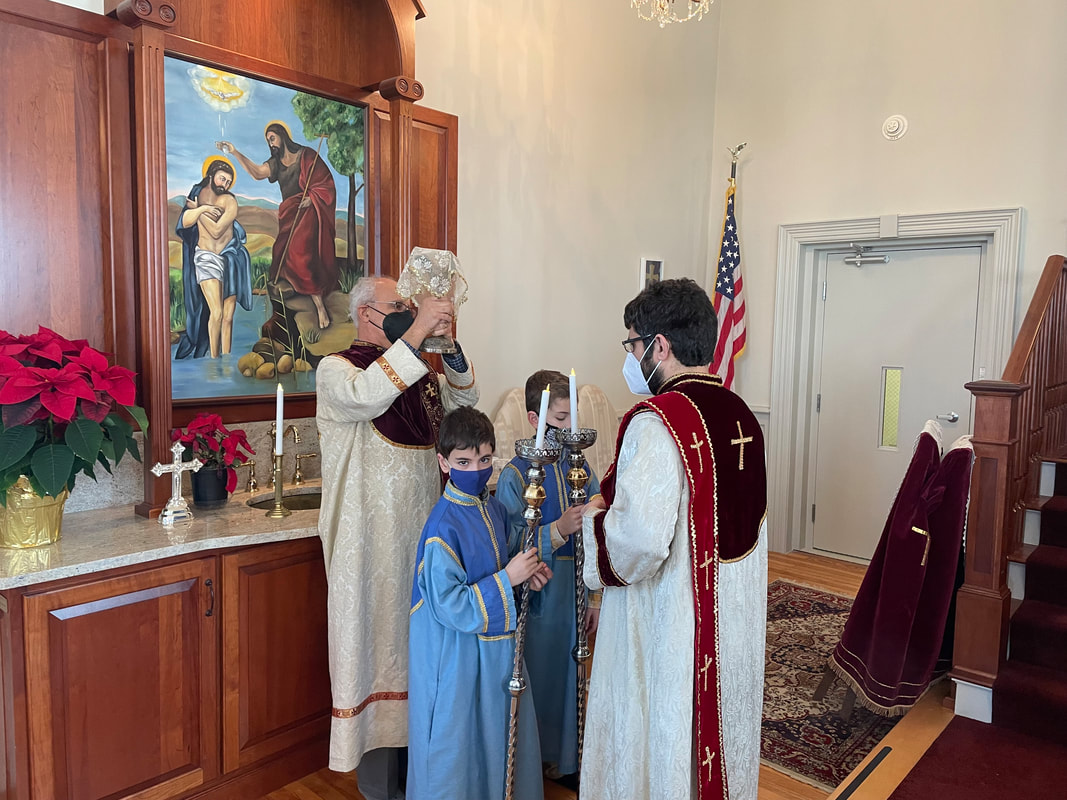
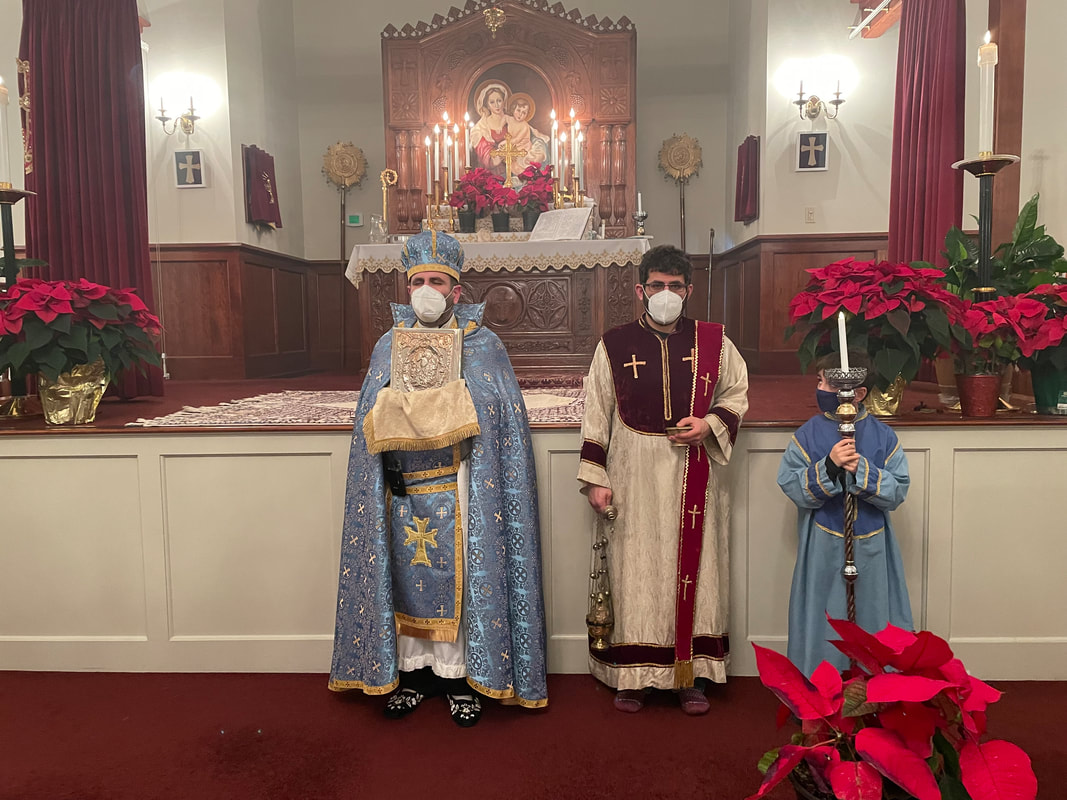
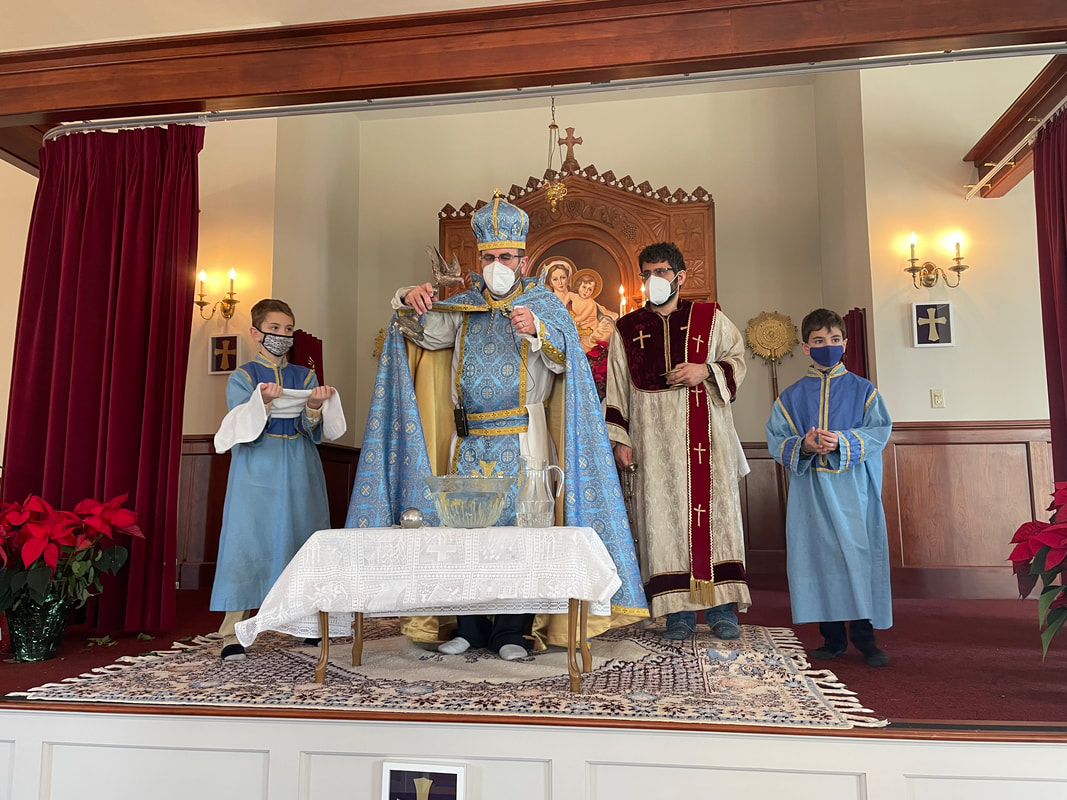
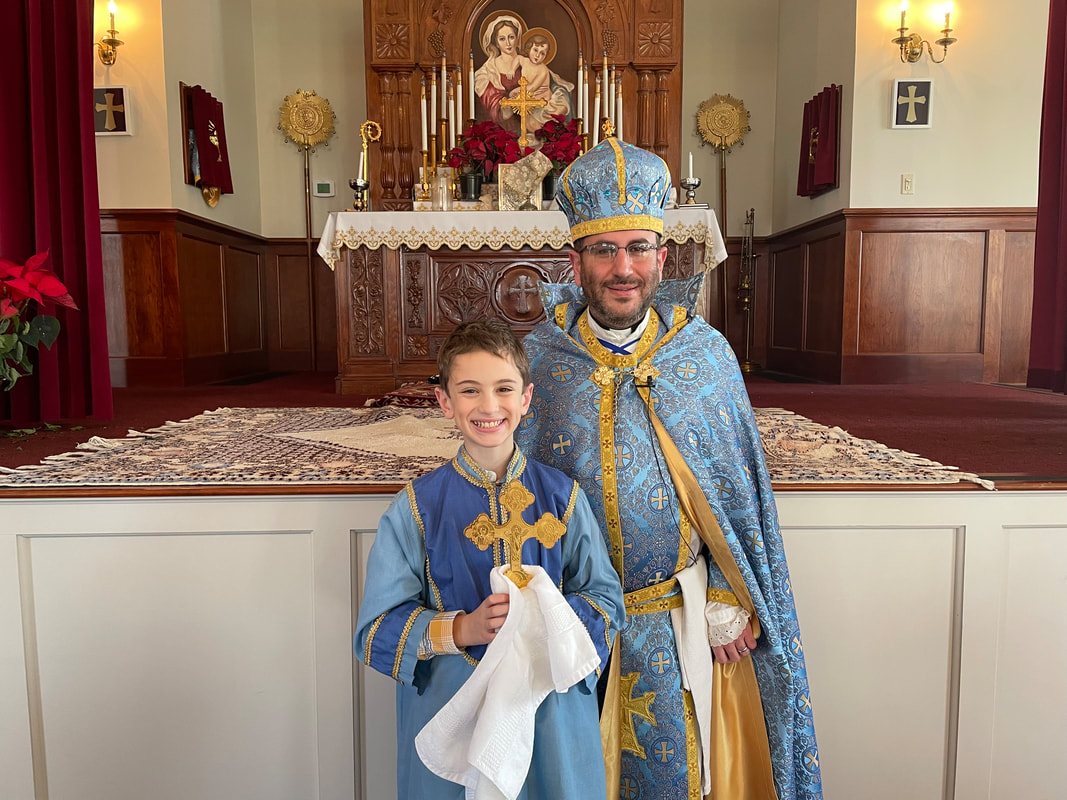







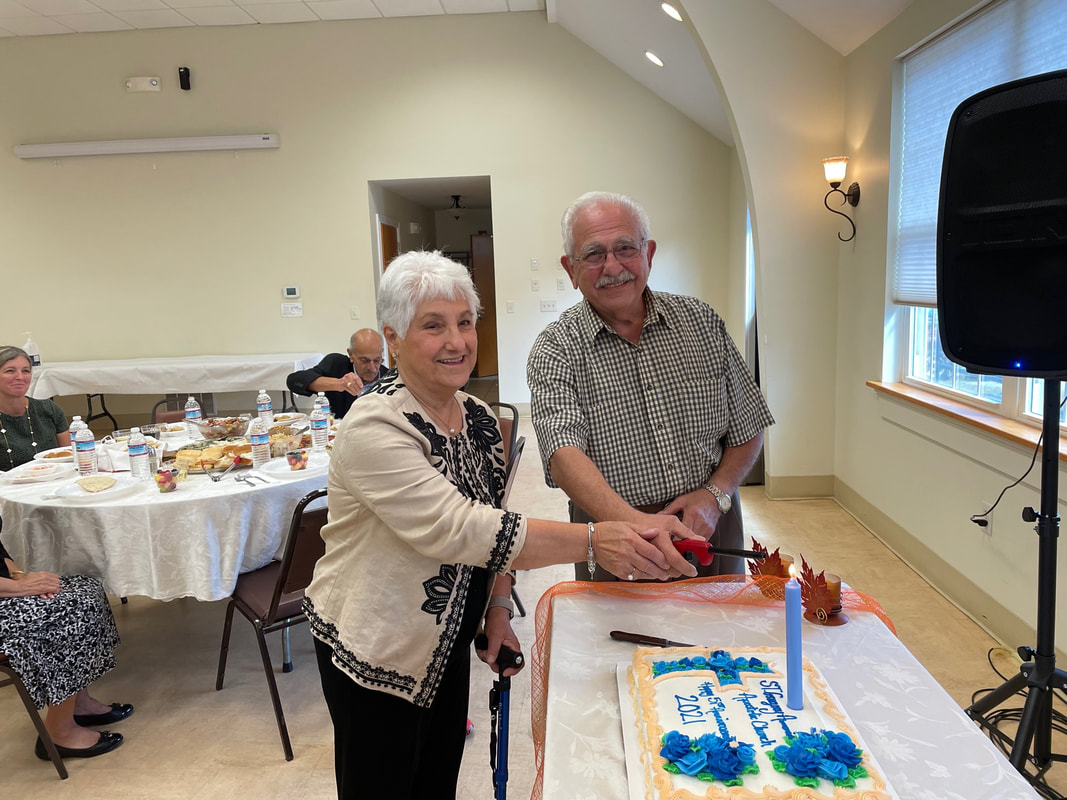
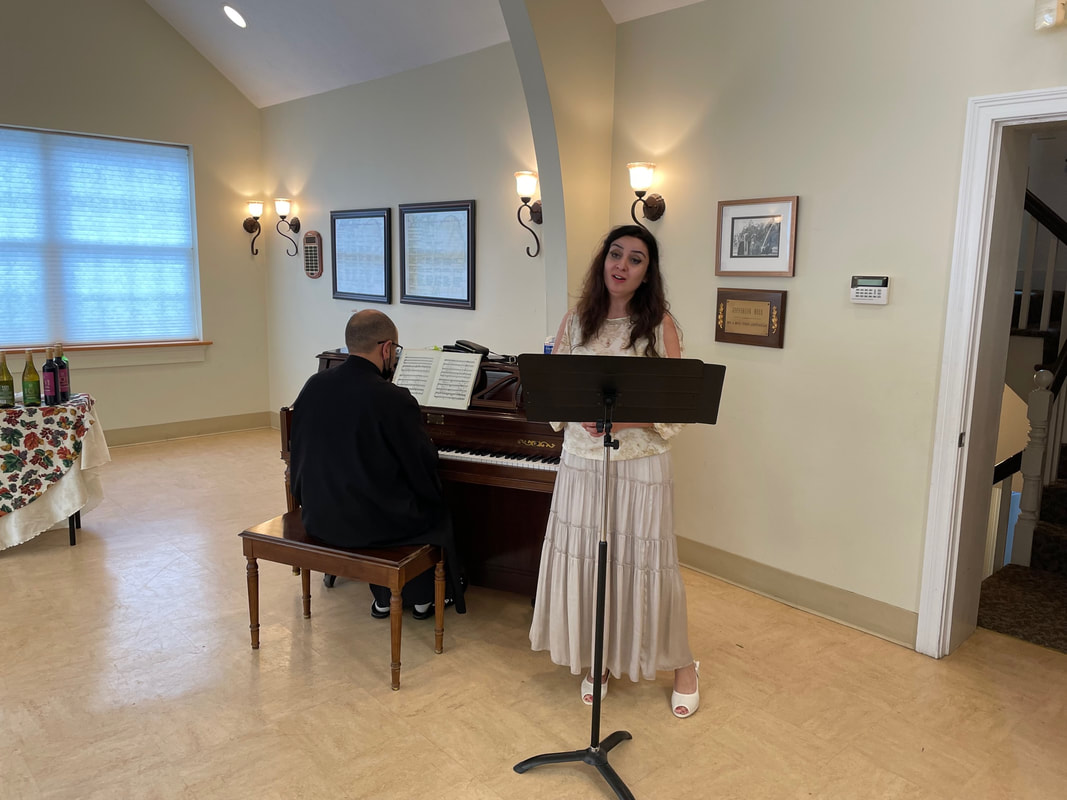
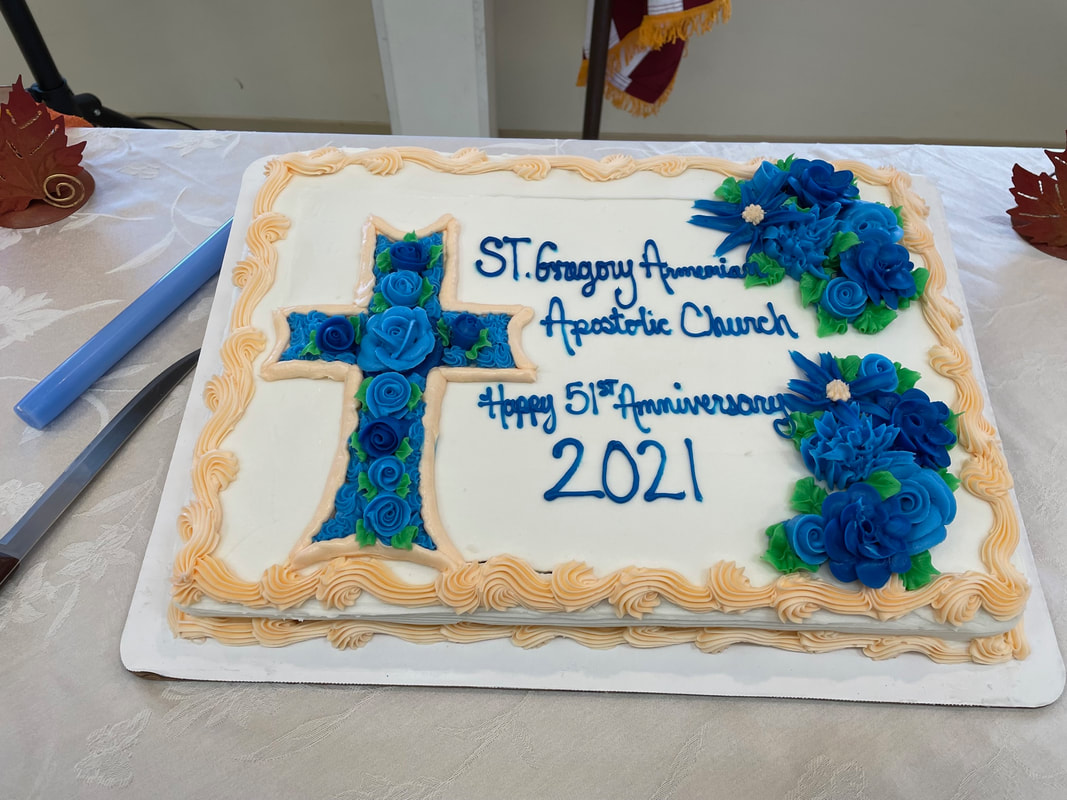
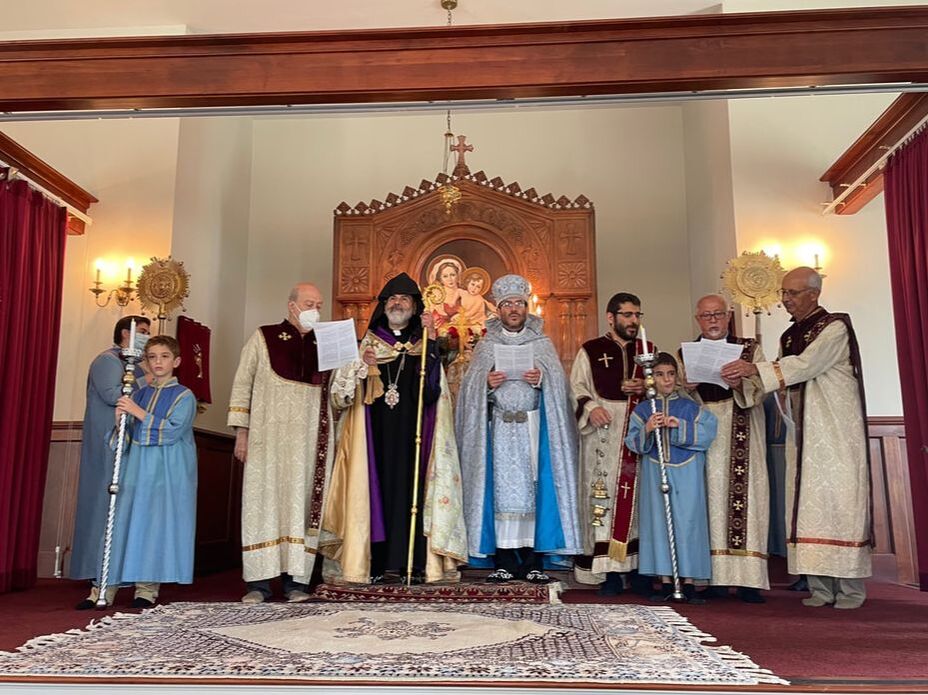
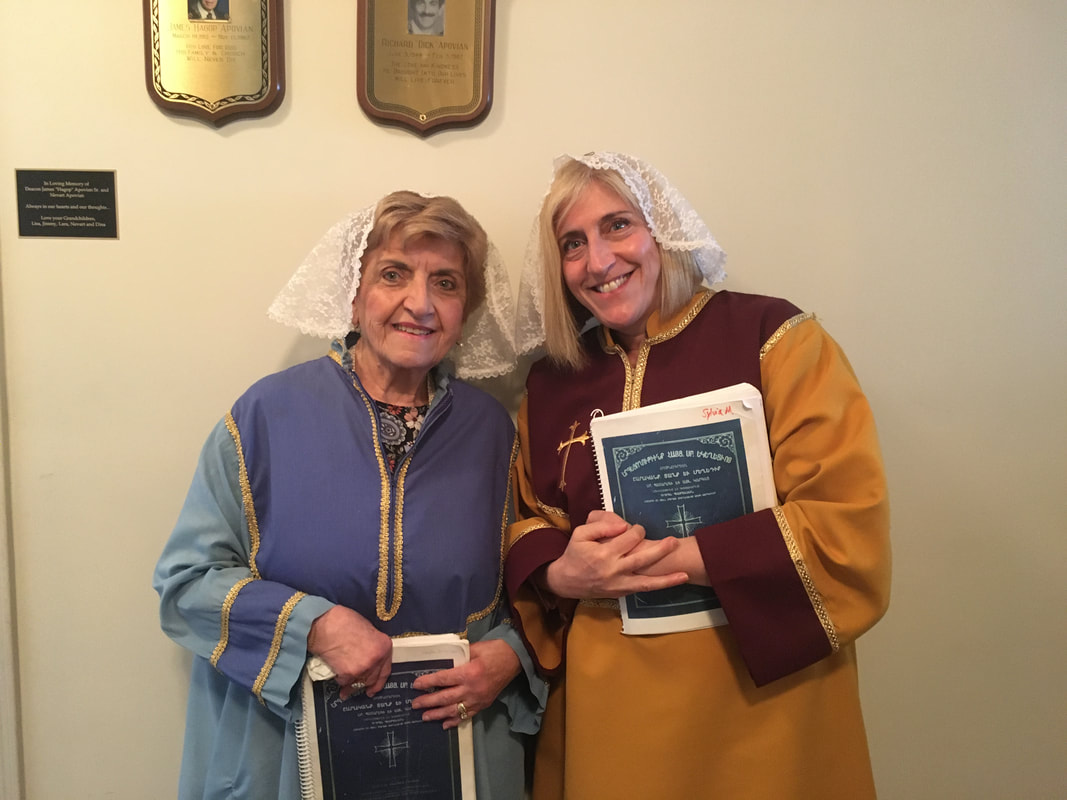
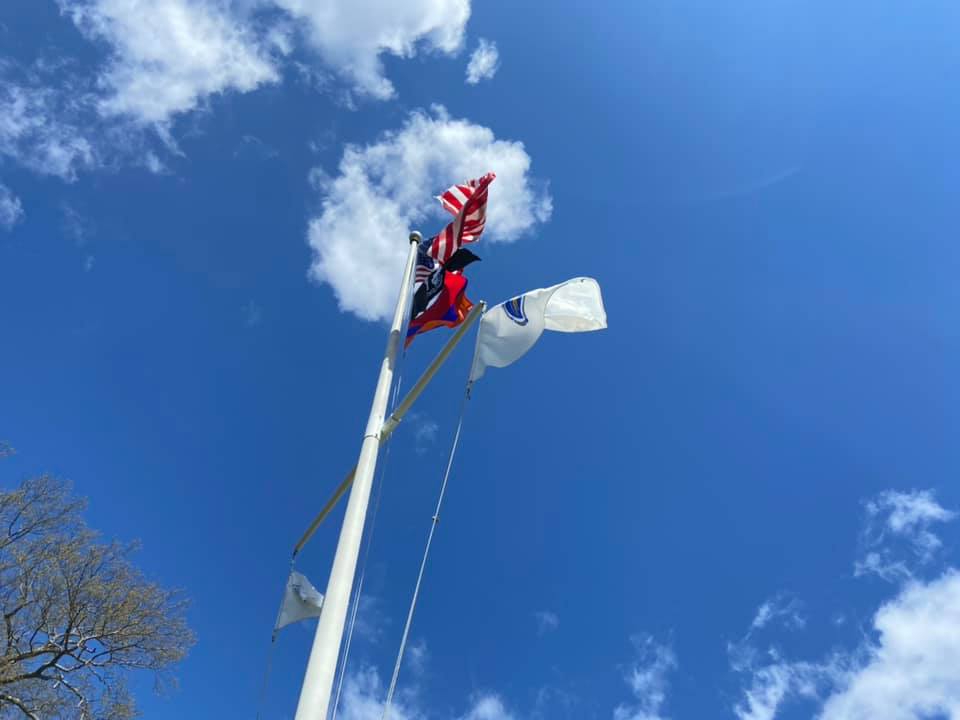
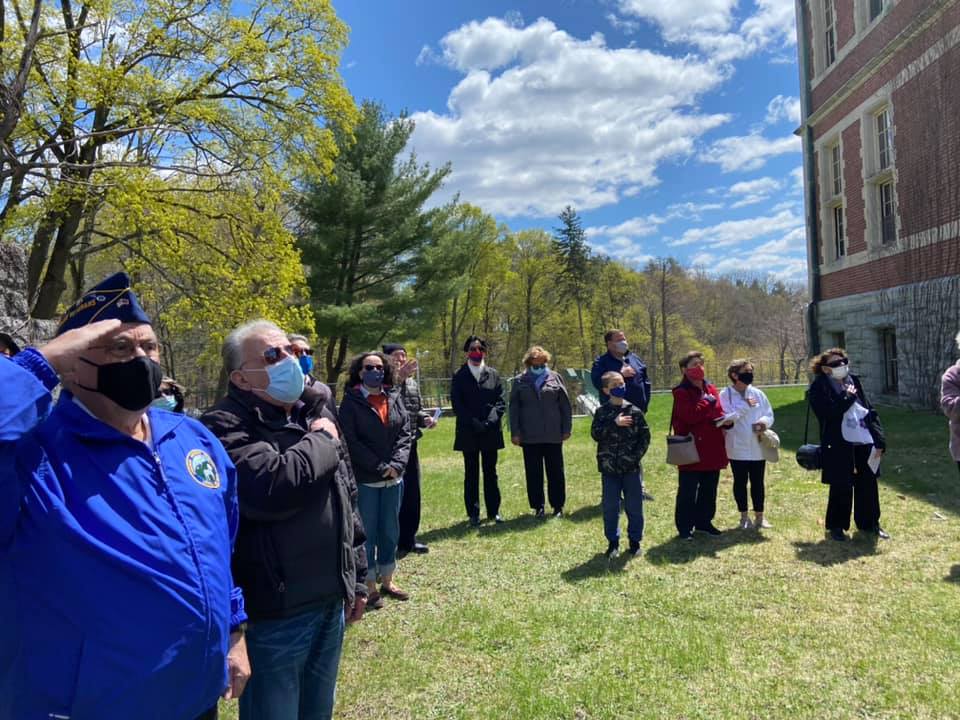
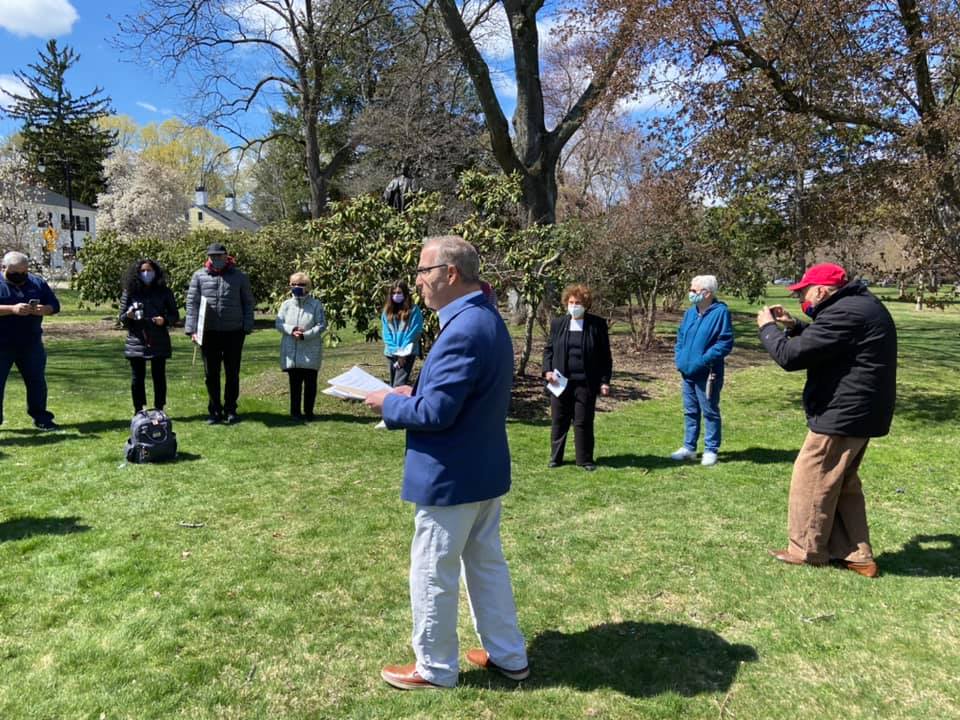
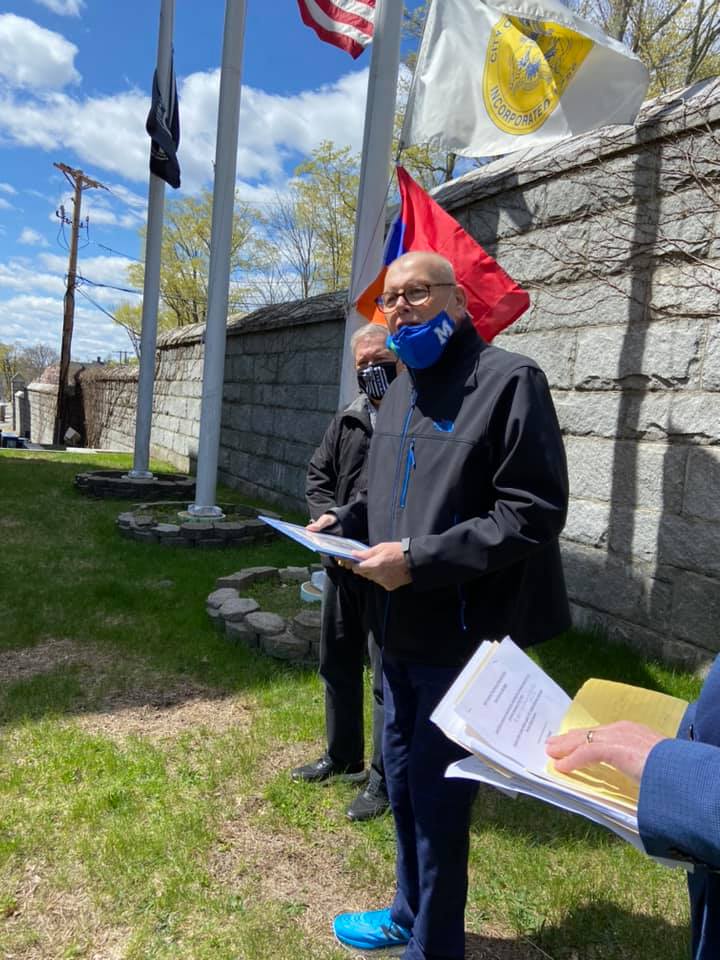
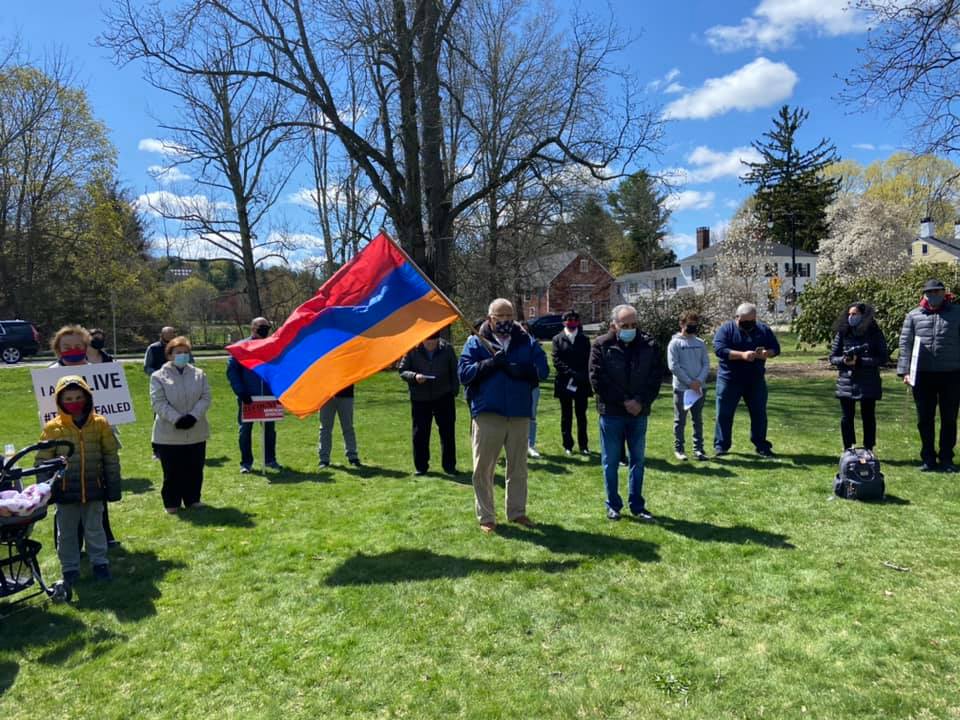
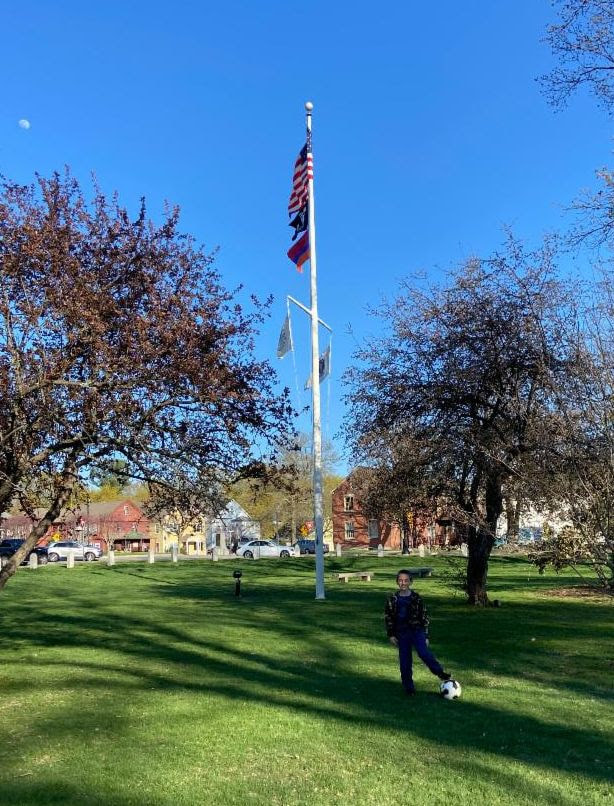
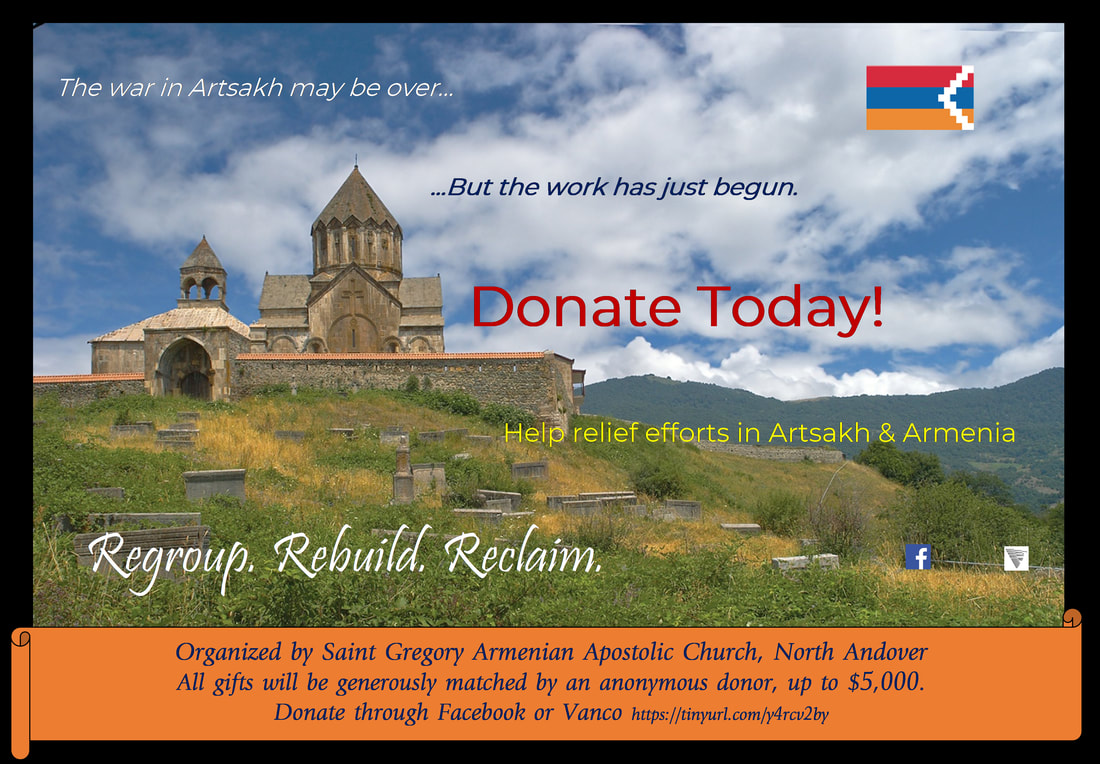
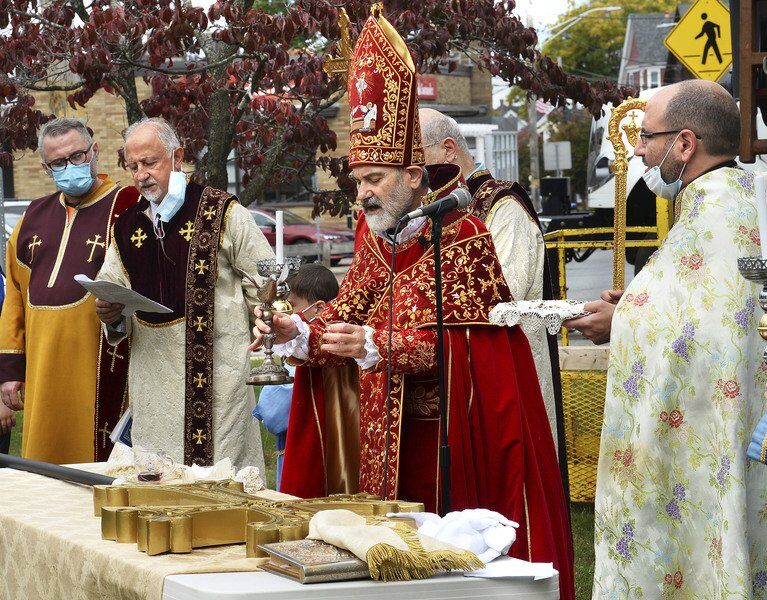
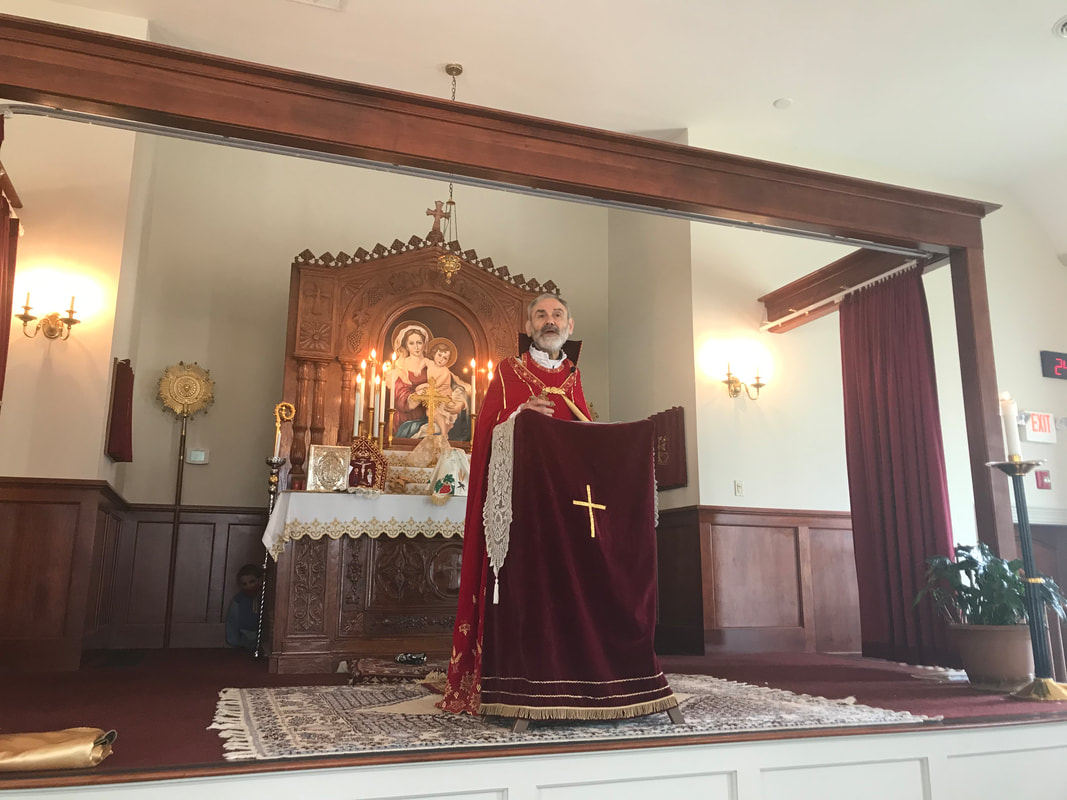
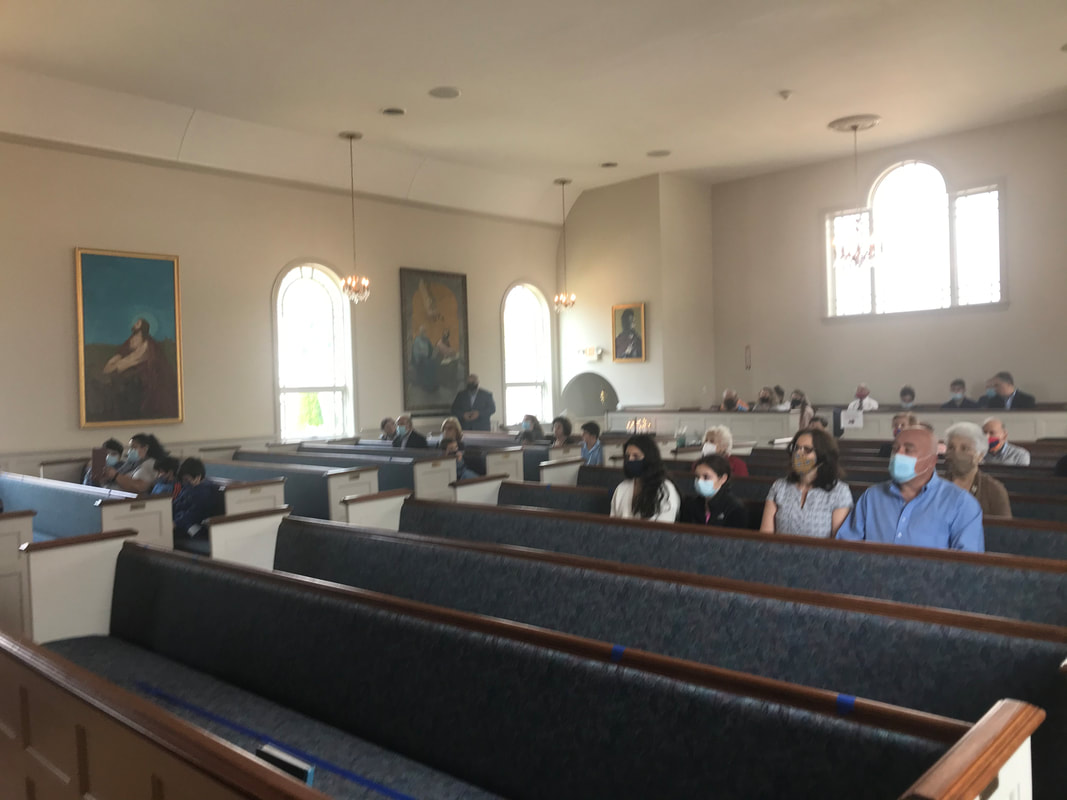

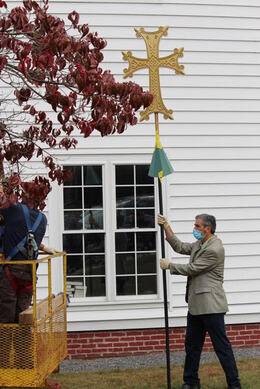
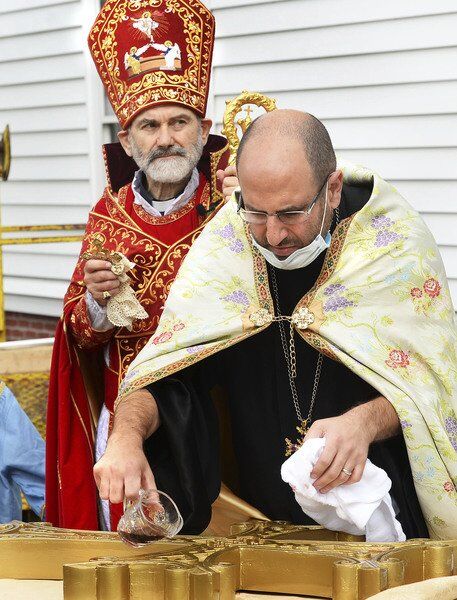
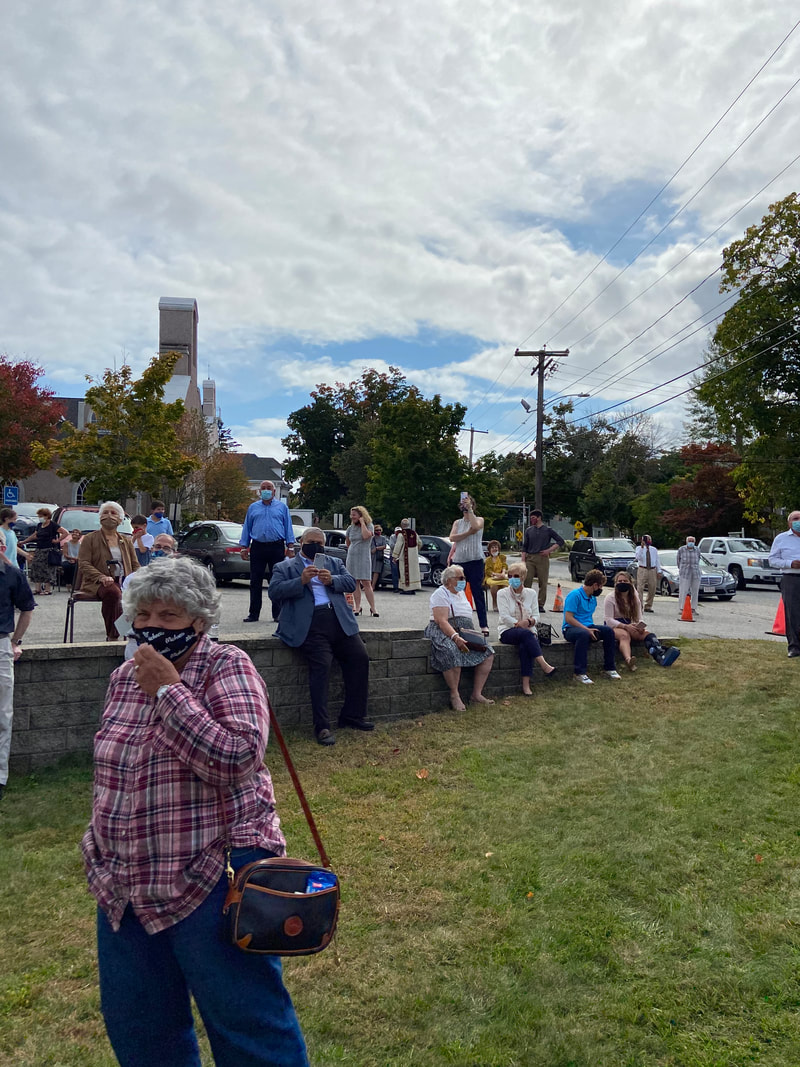
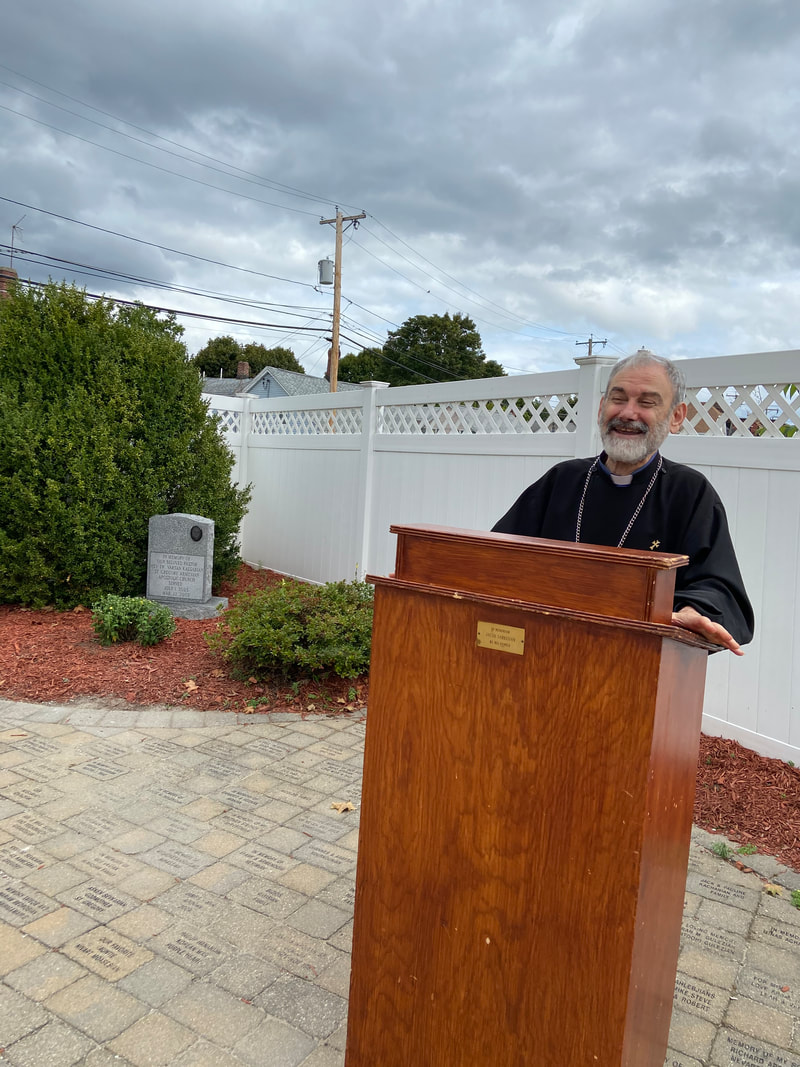
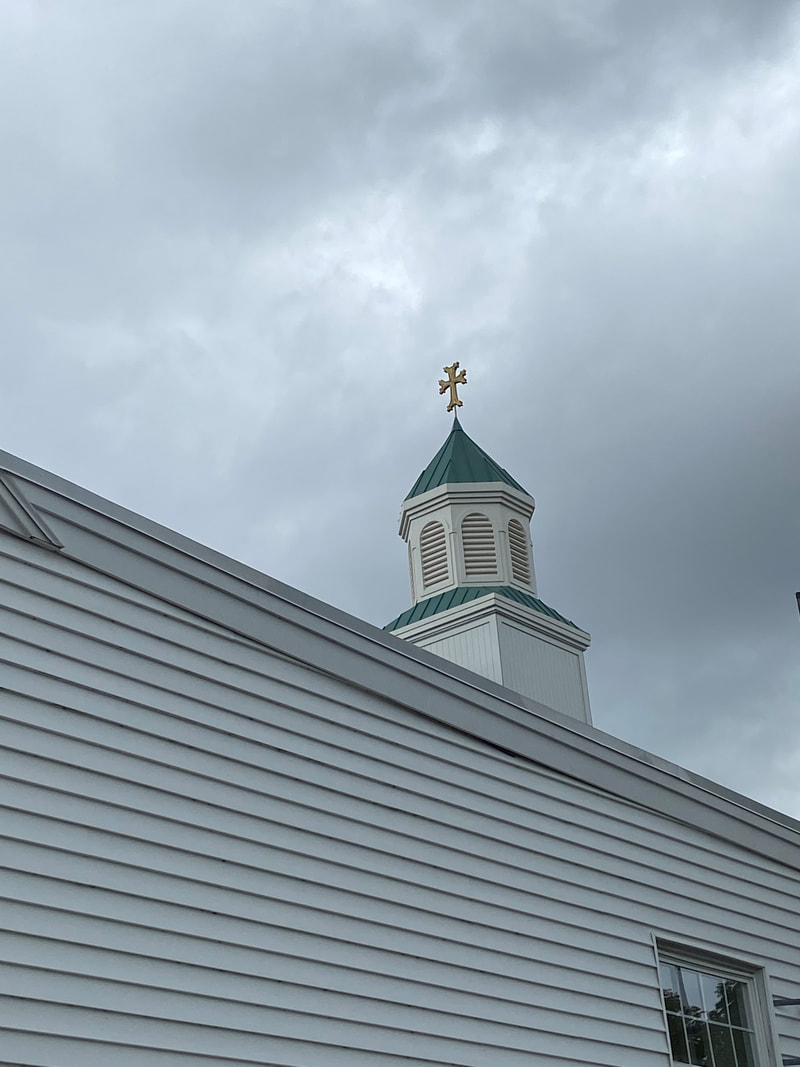

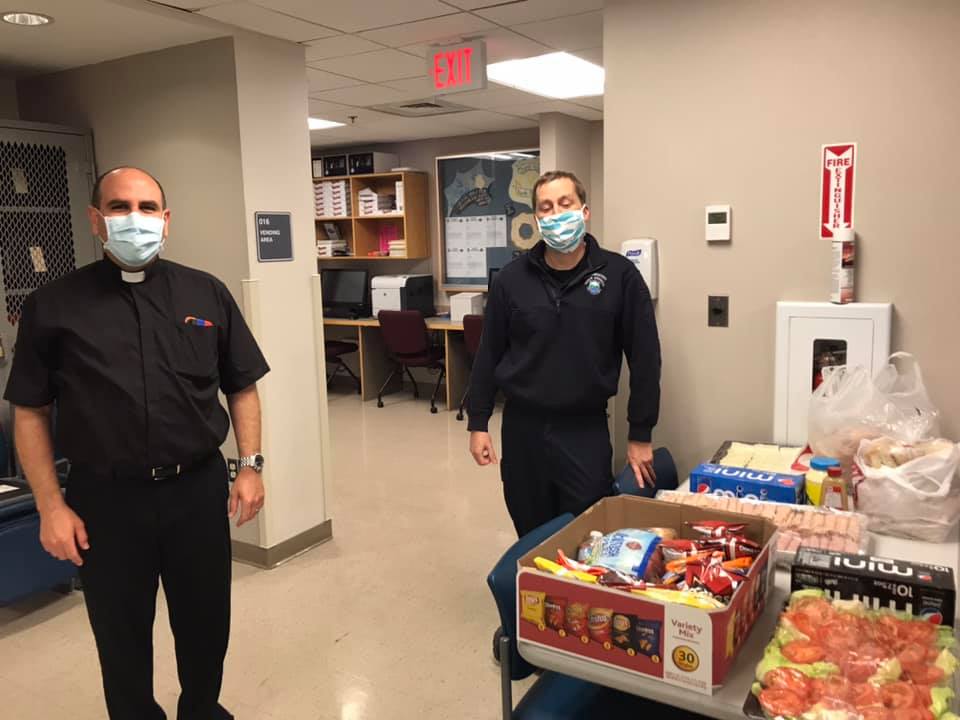
 RSS Feed
RSS Feed